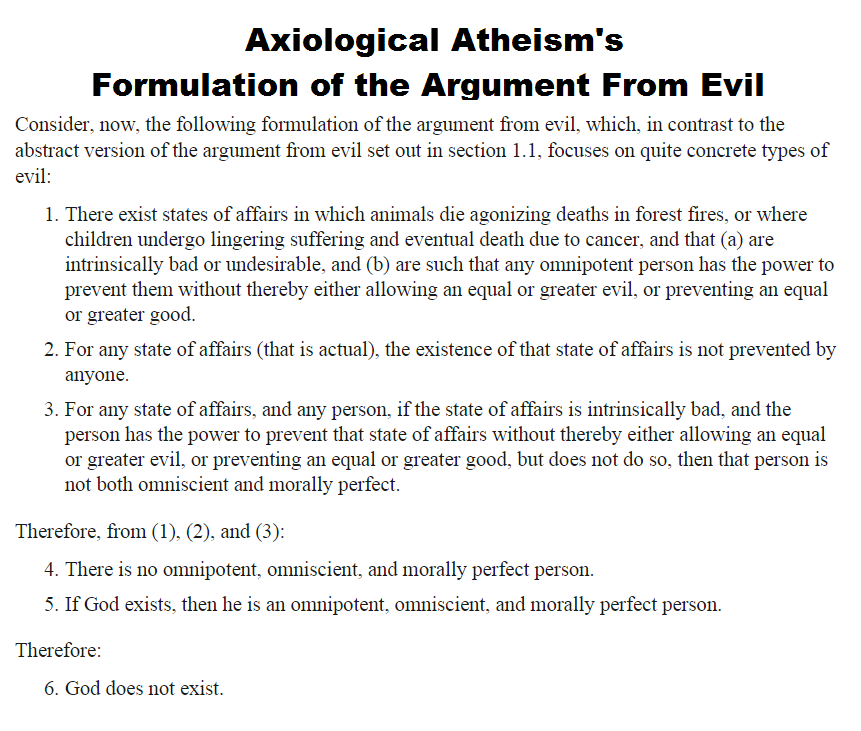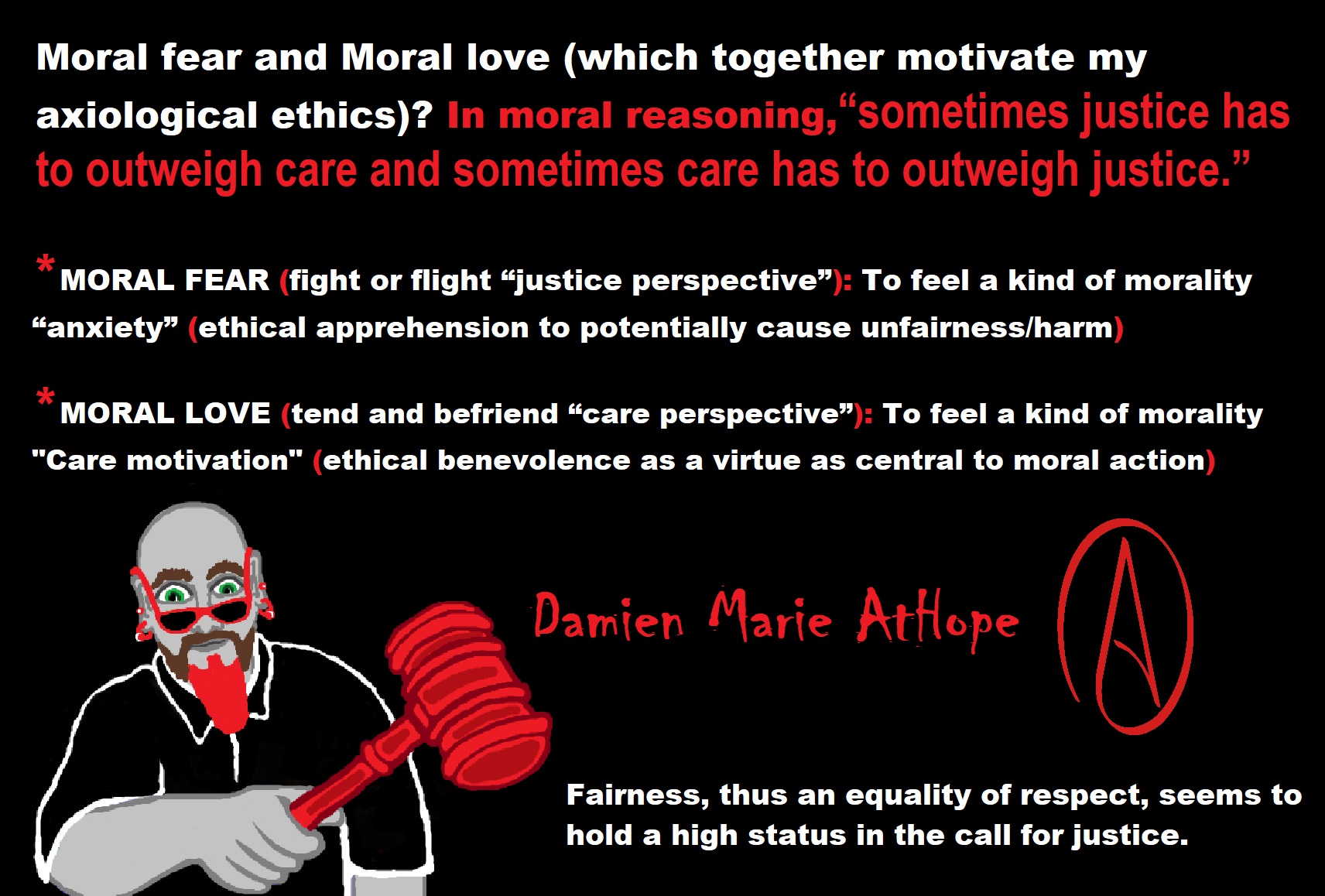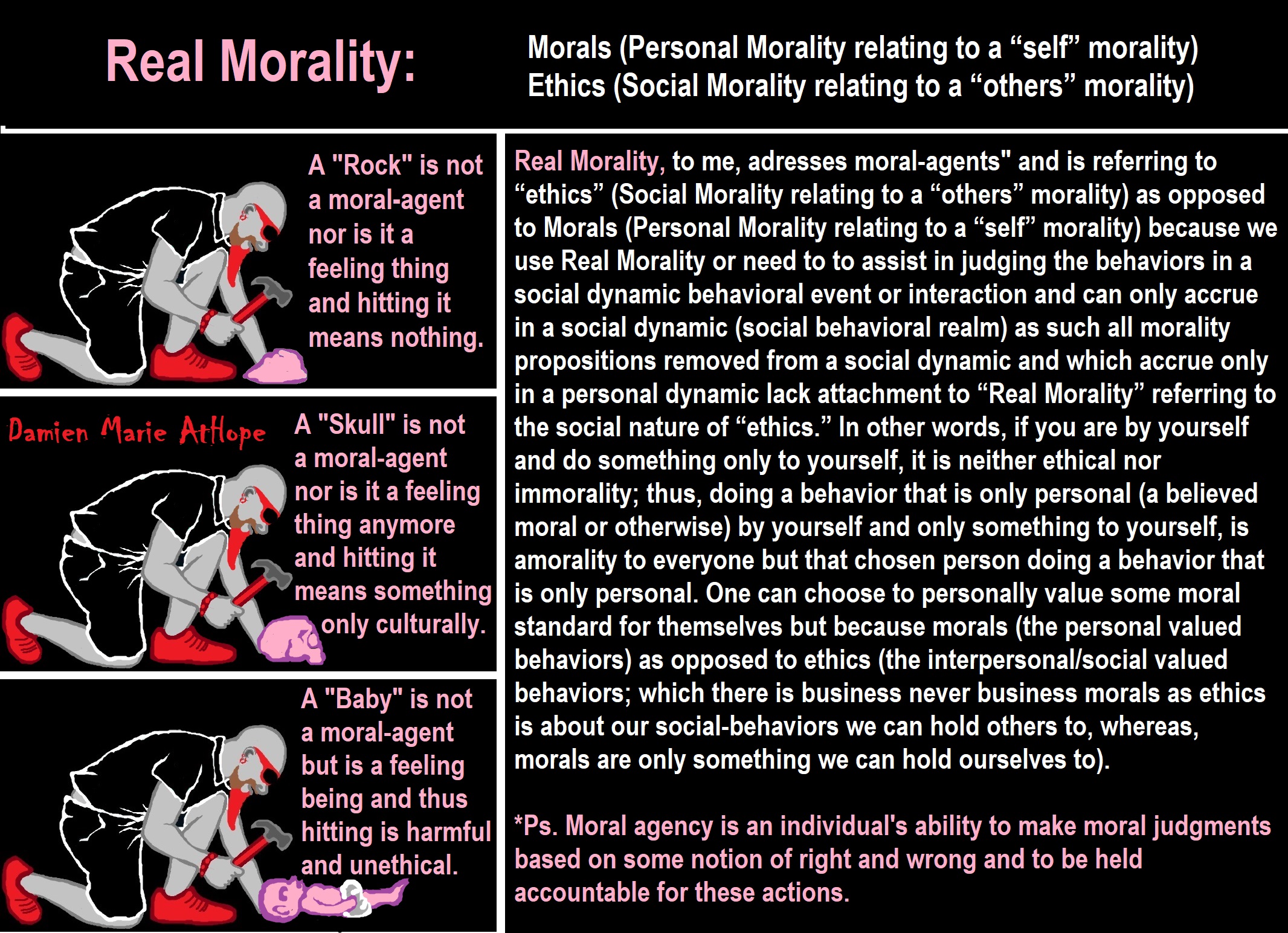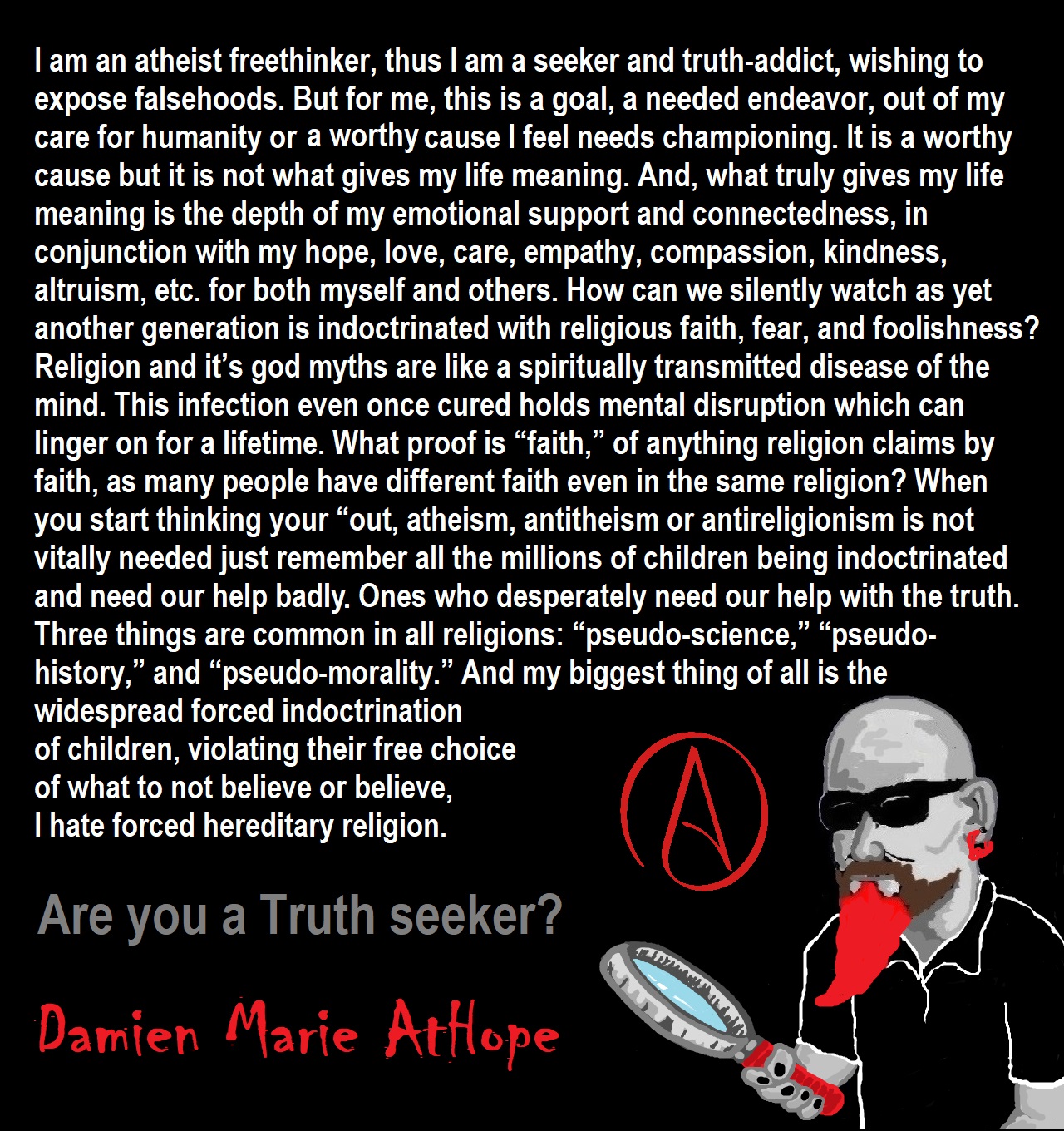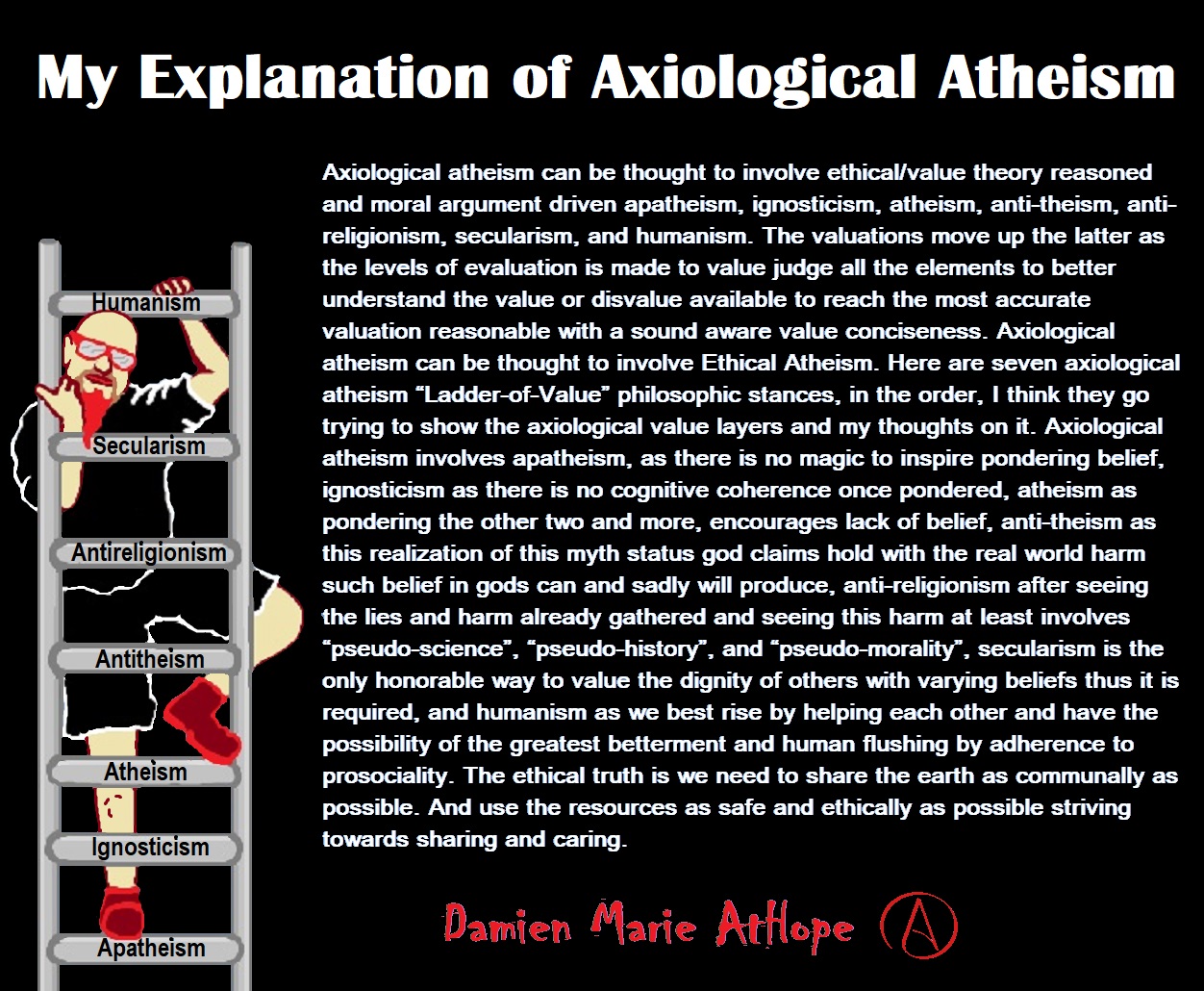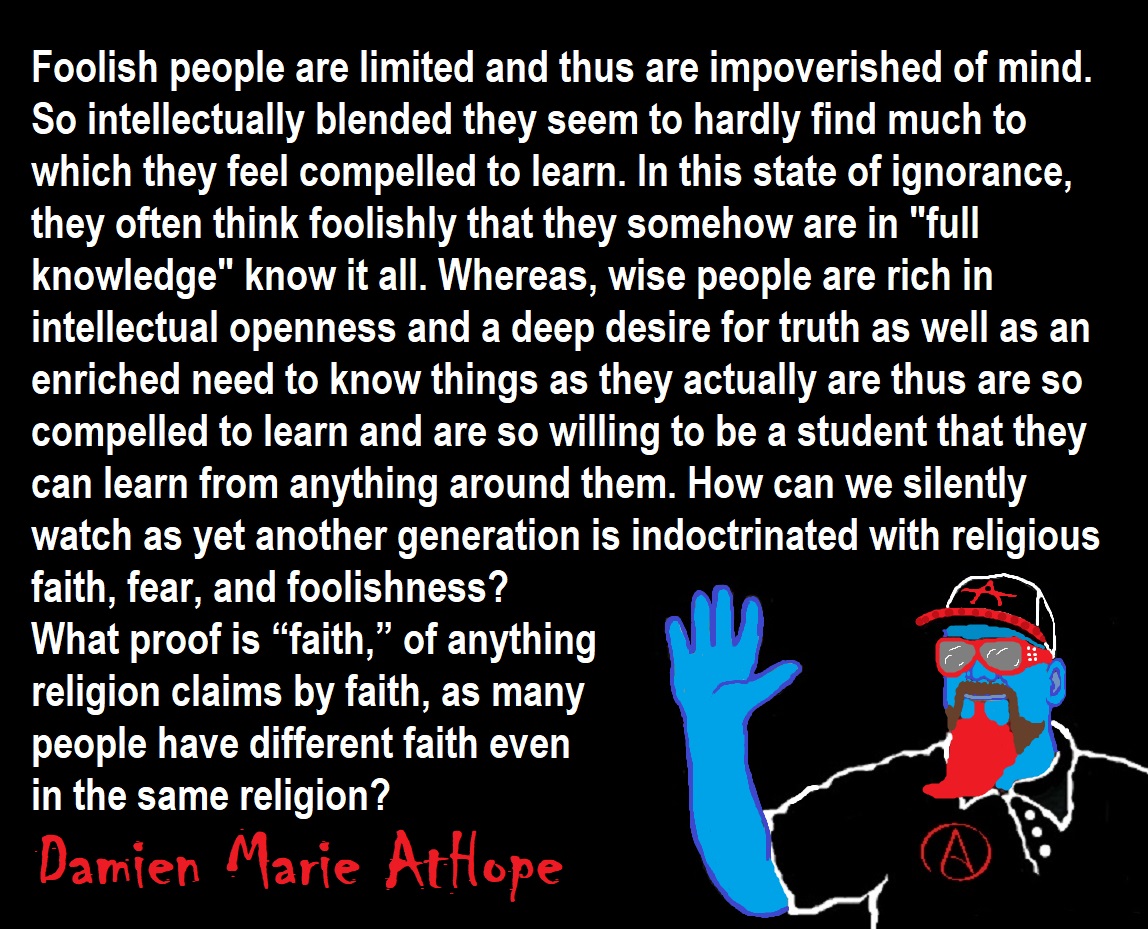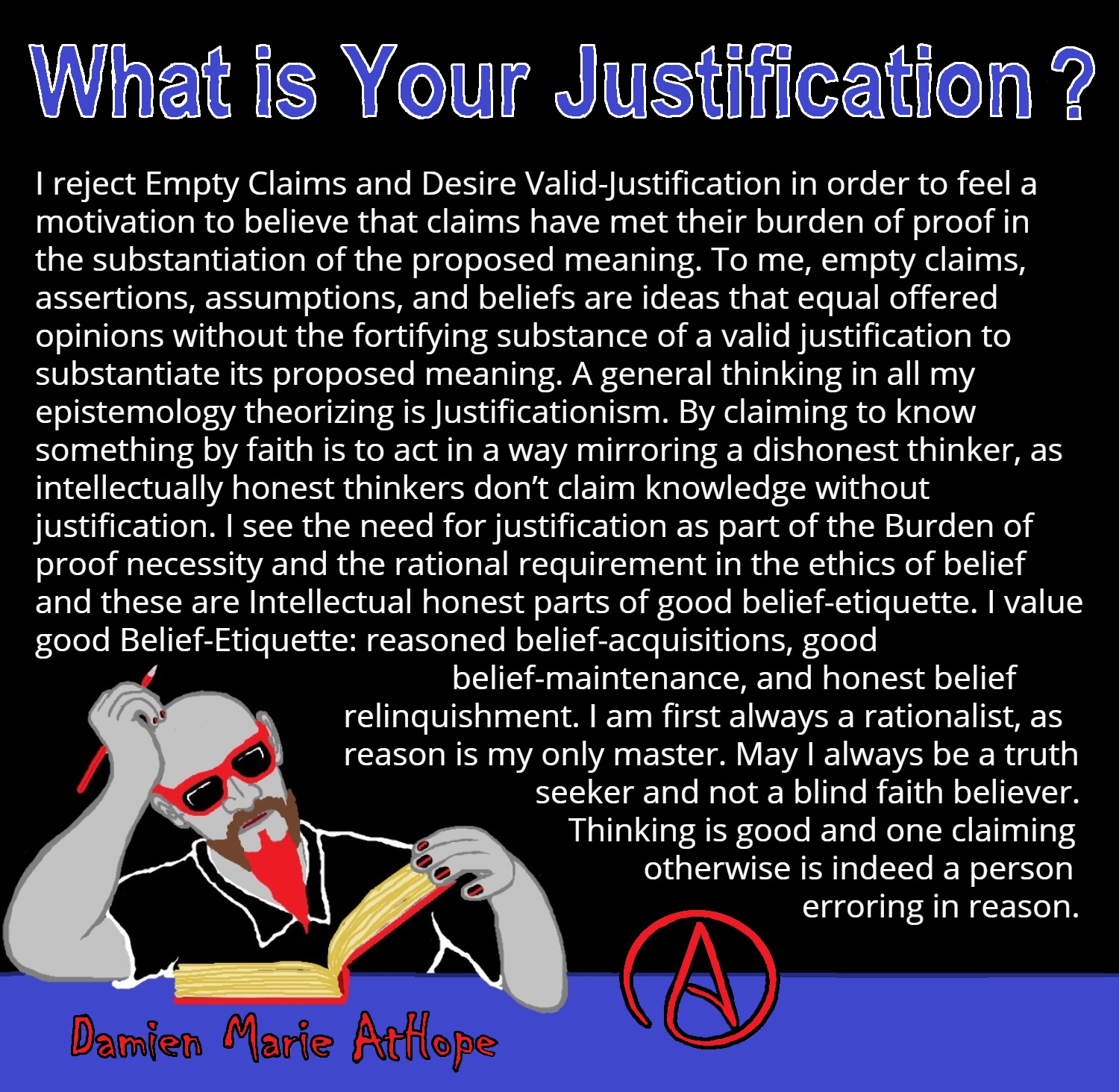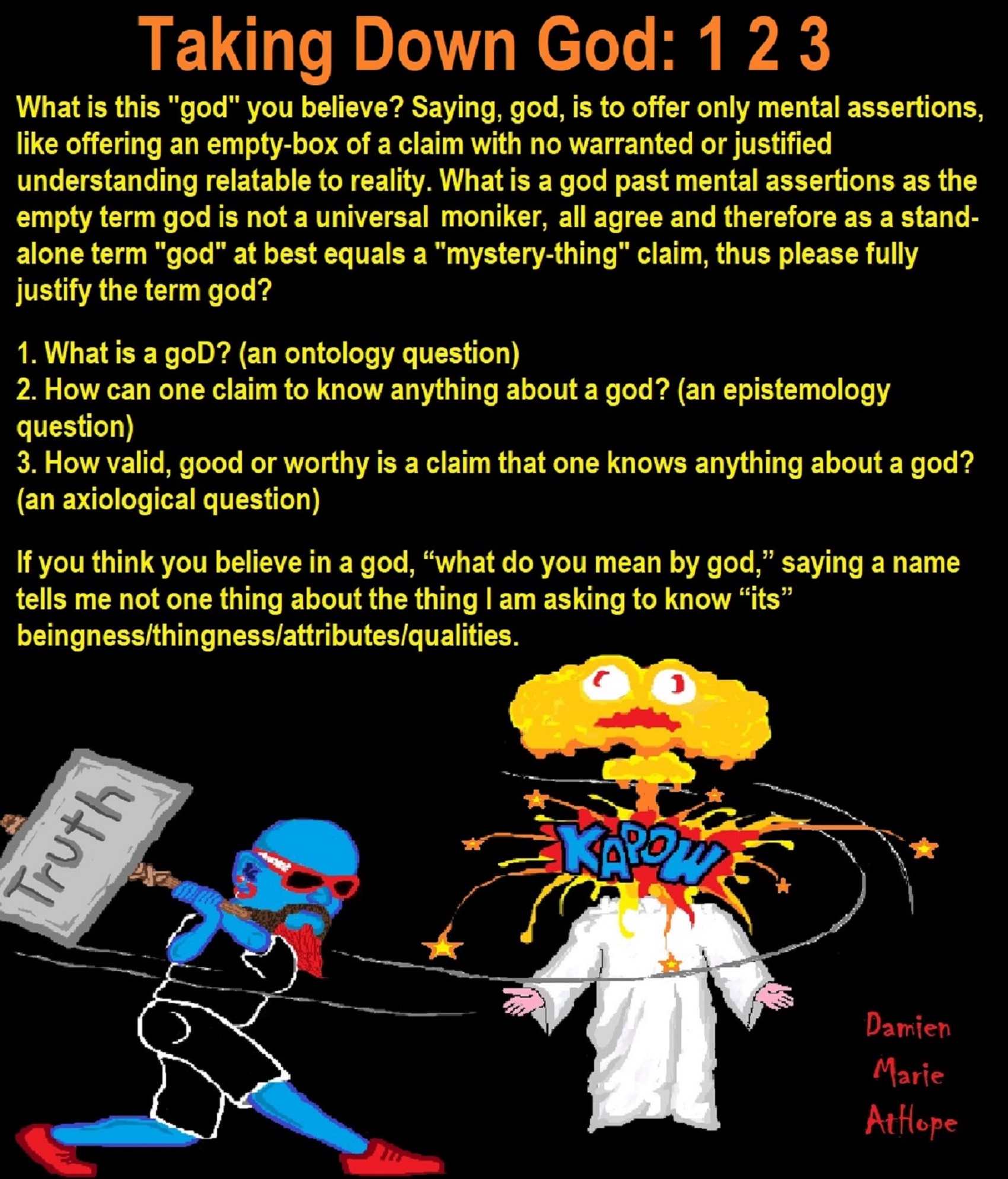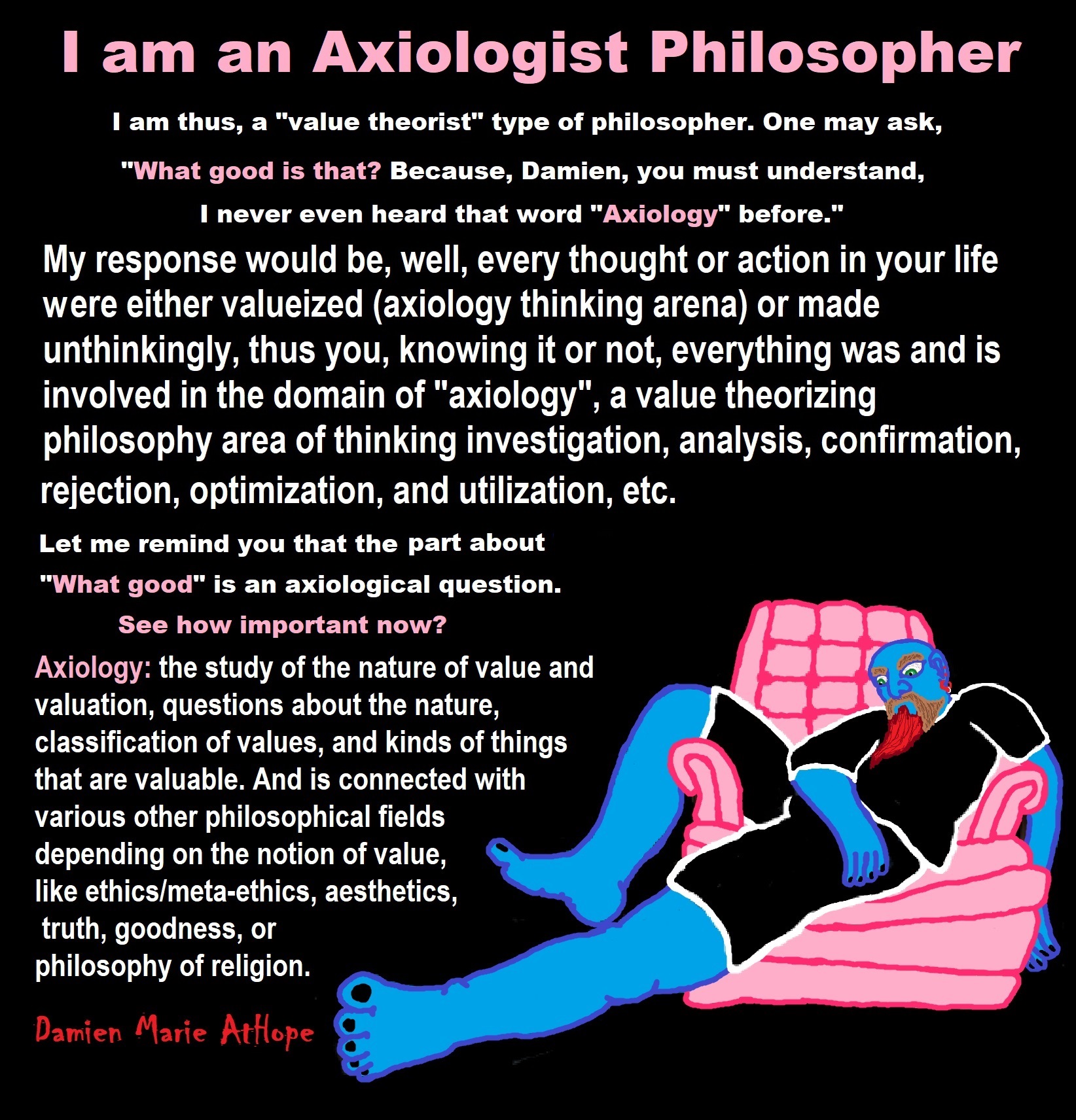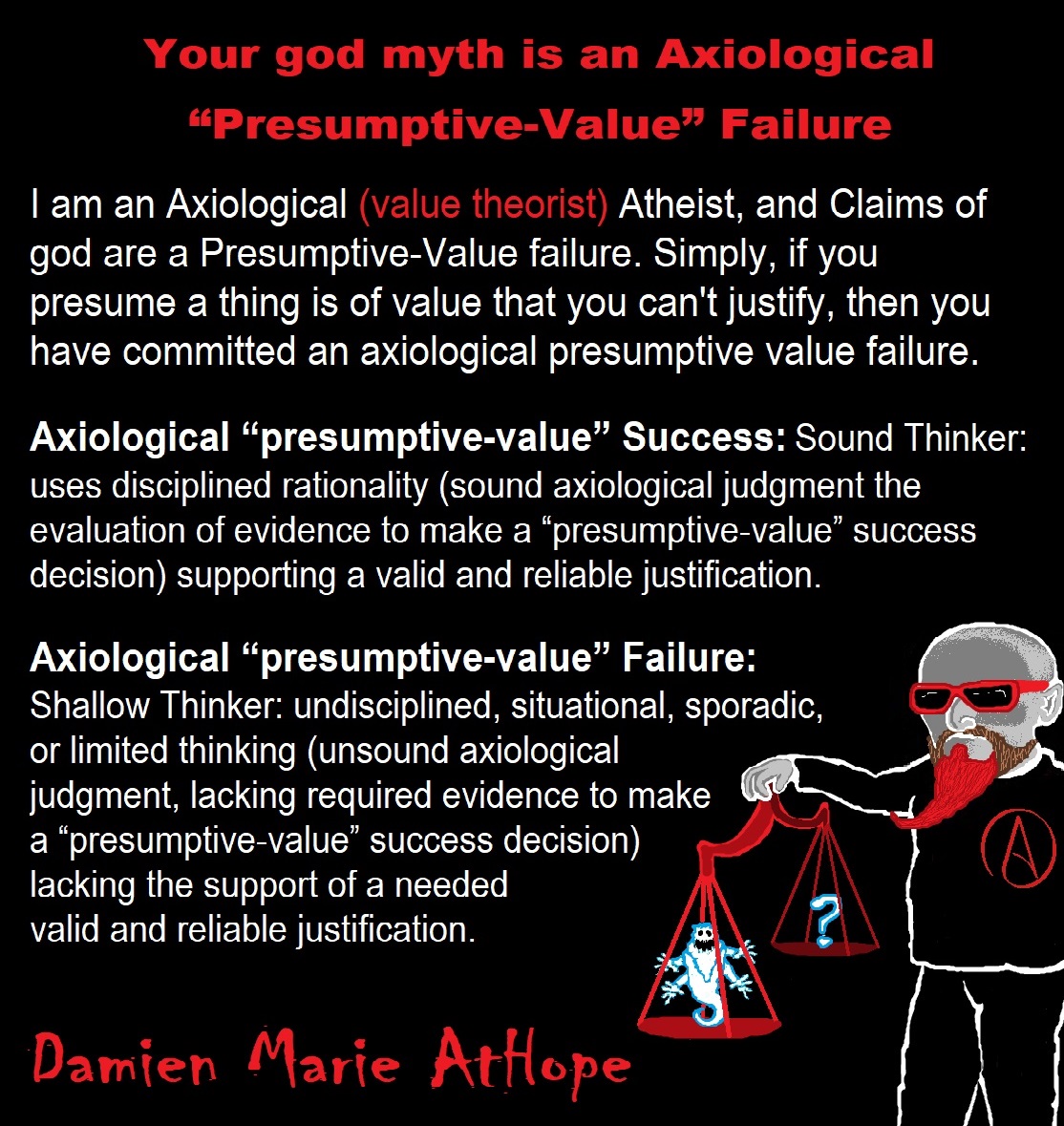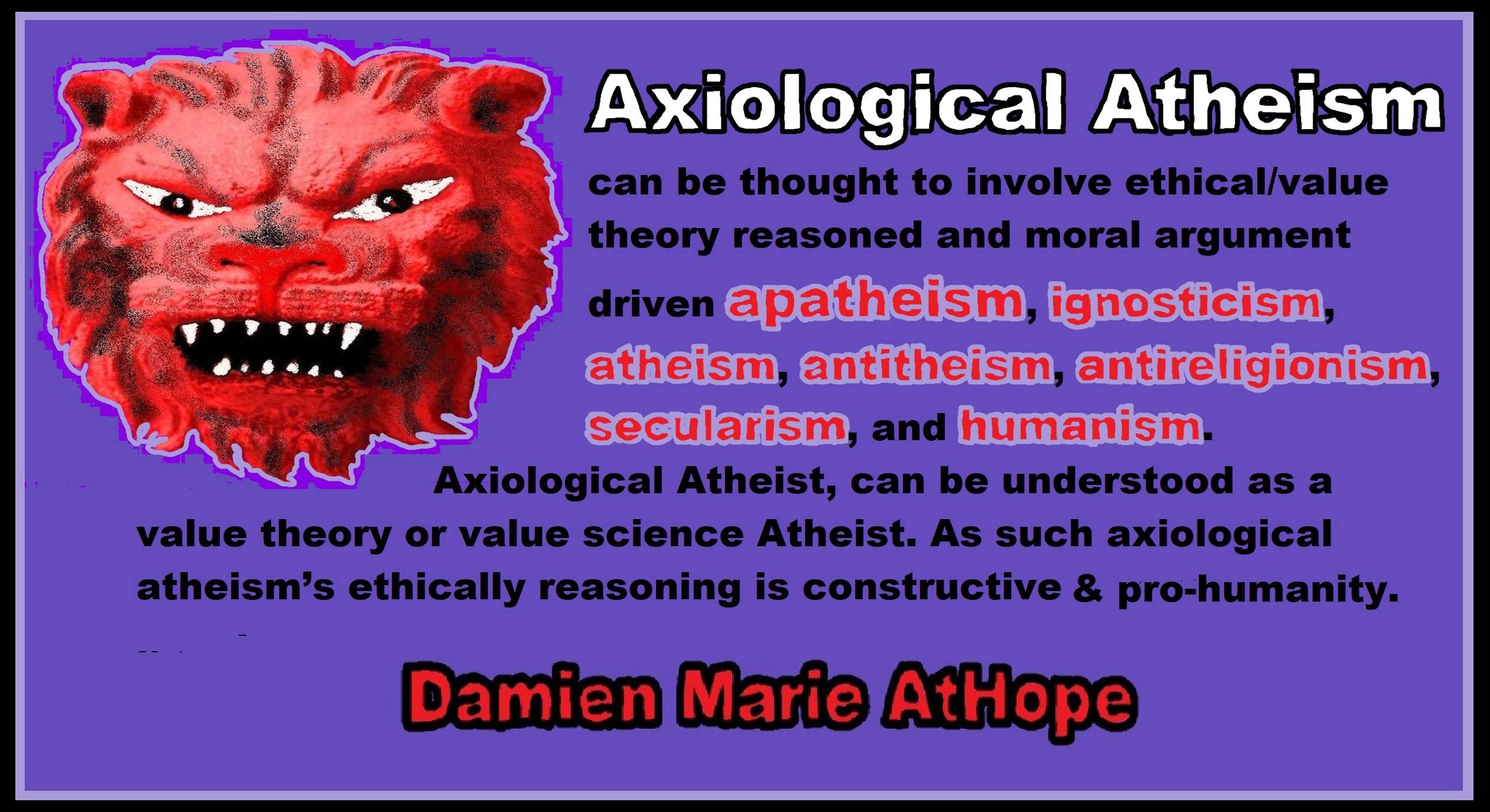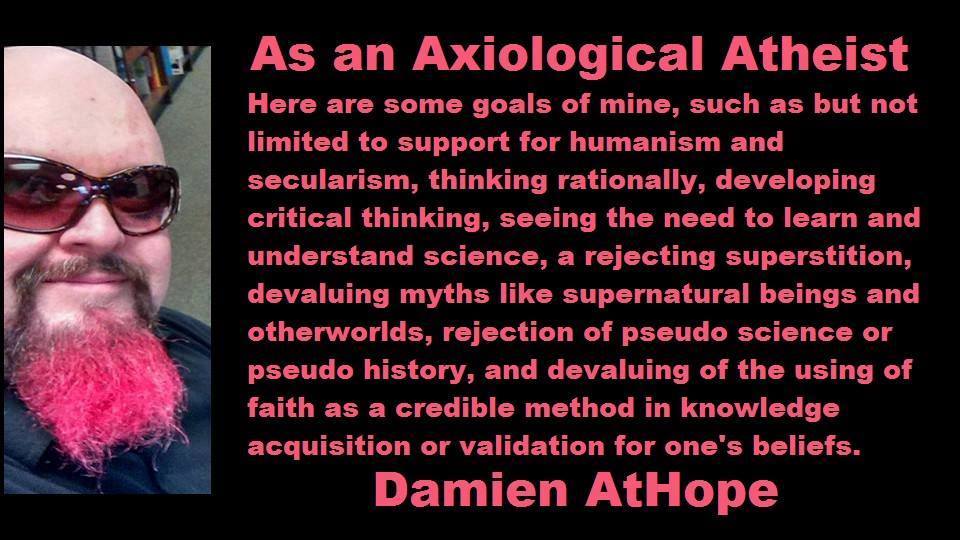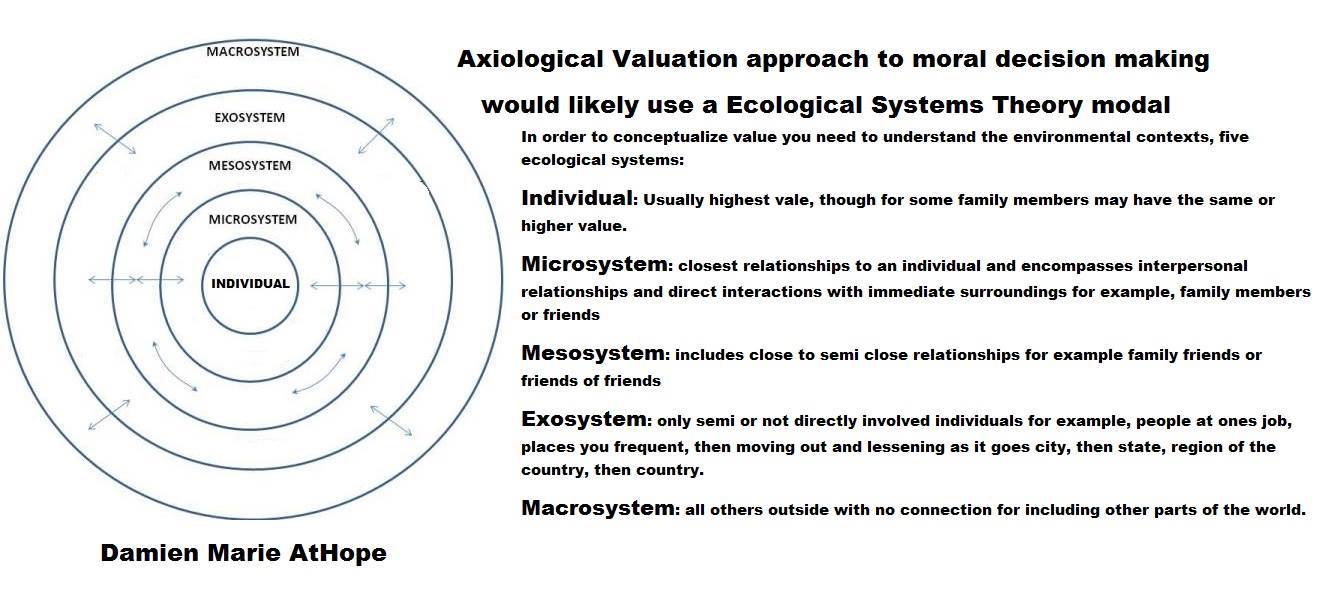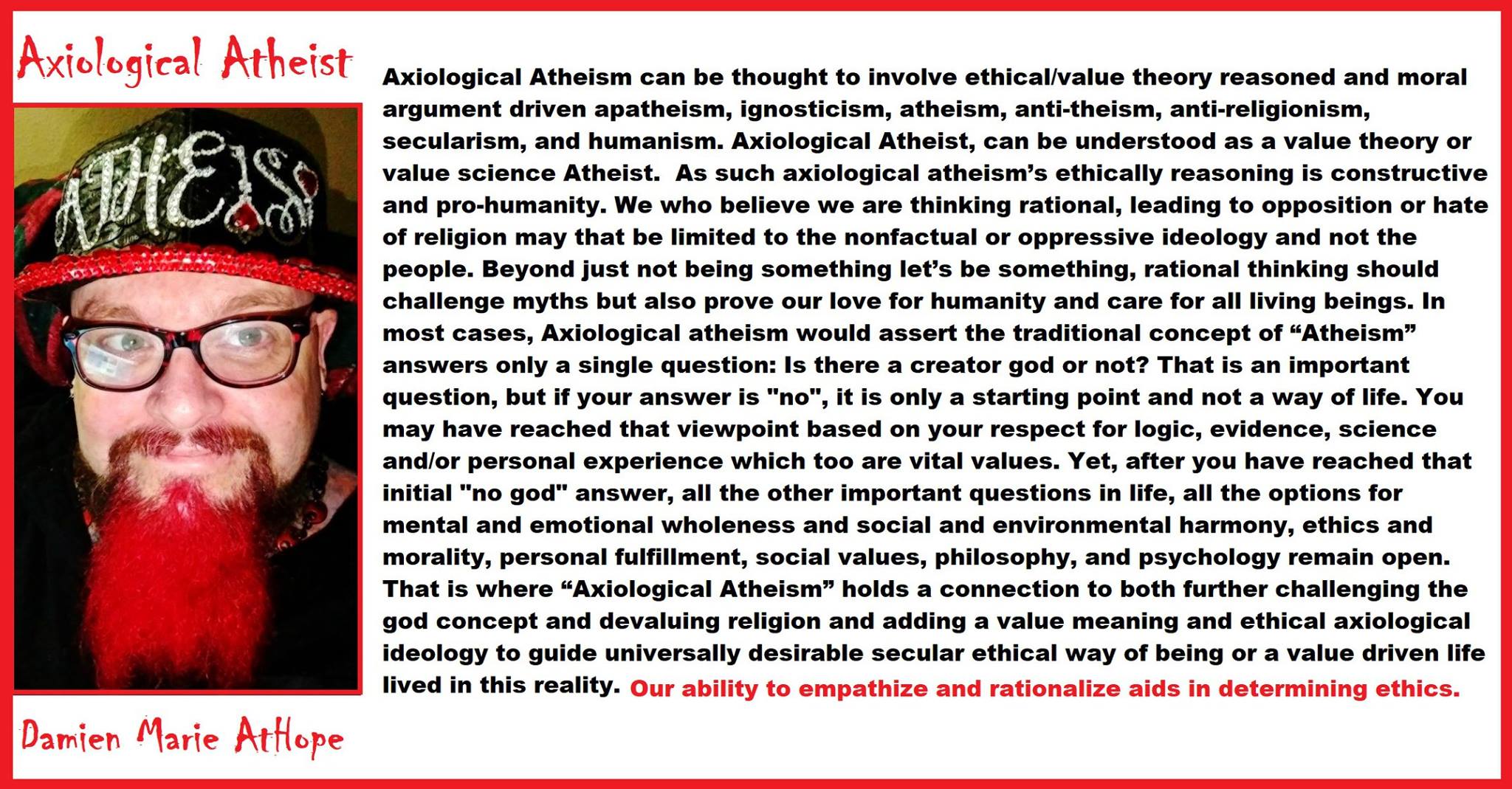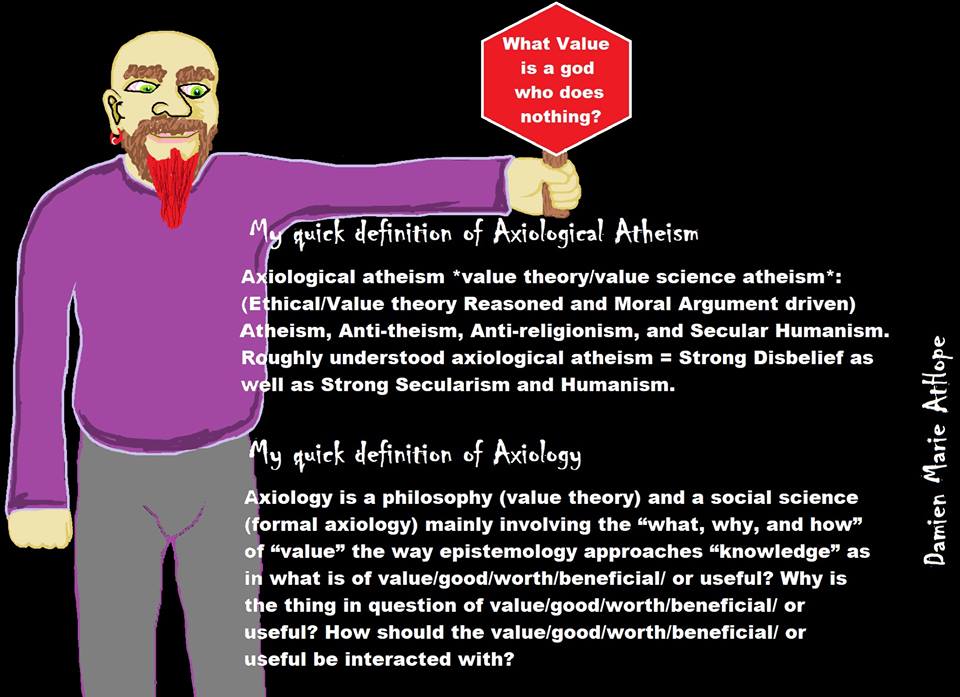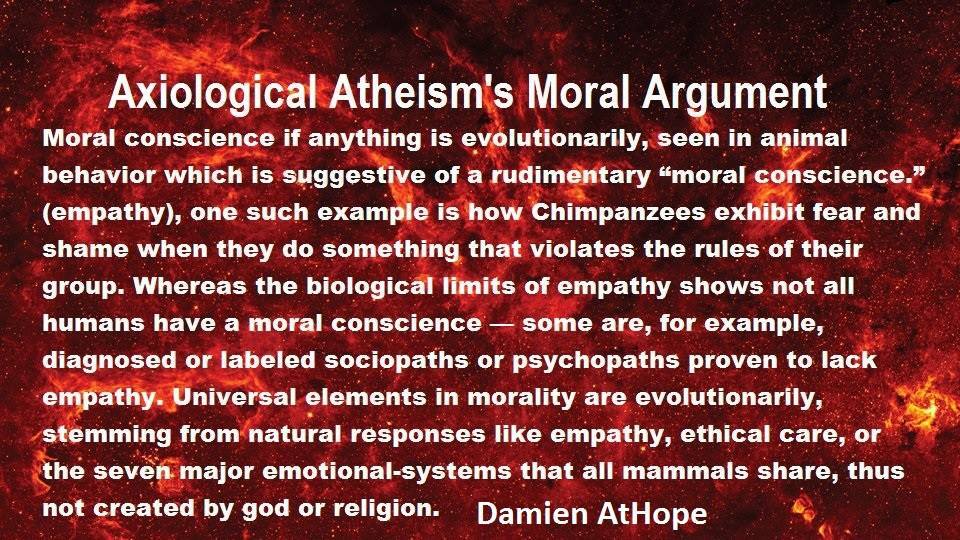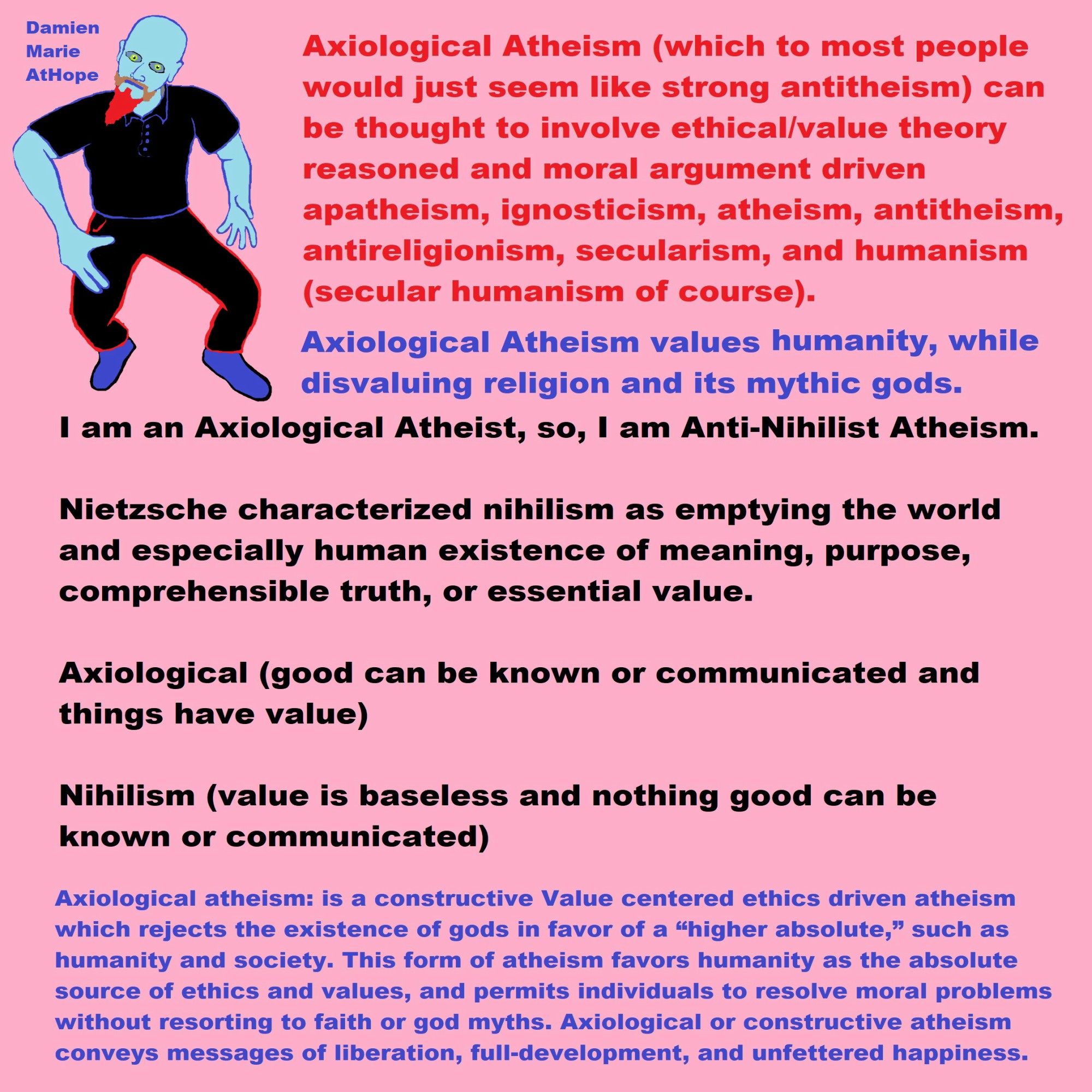
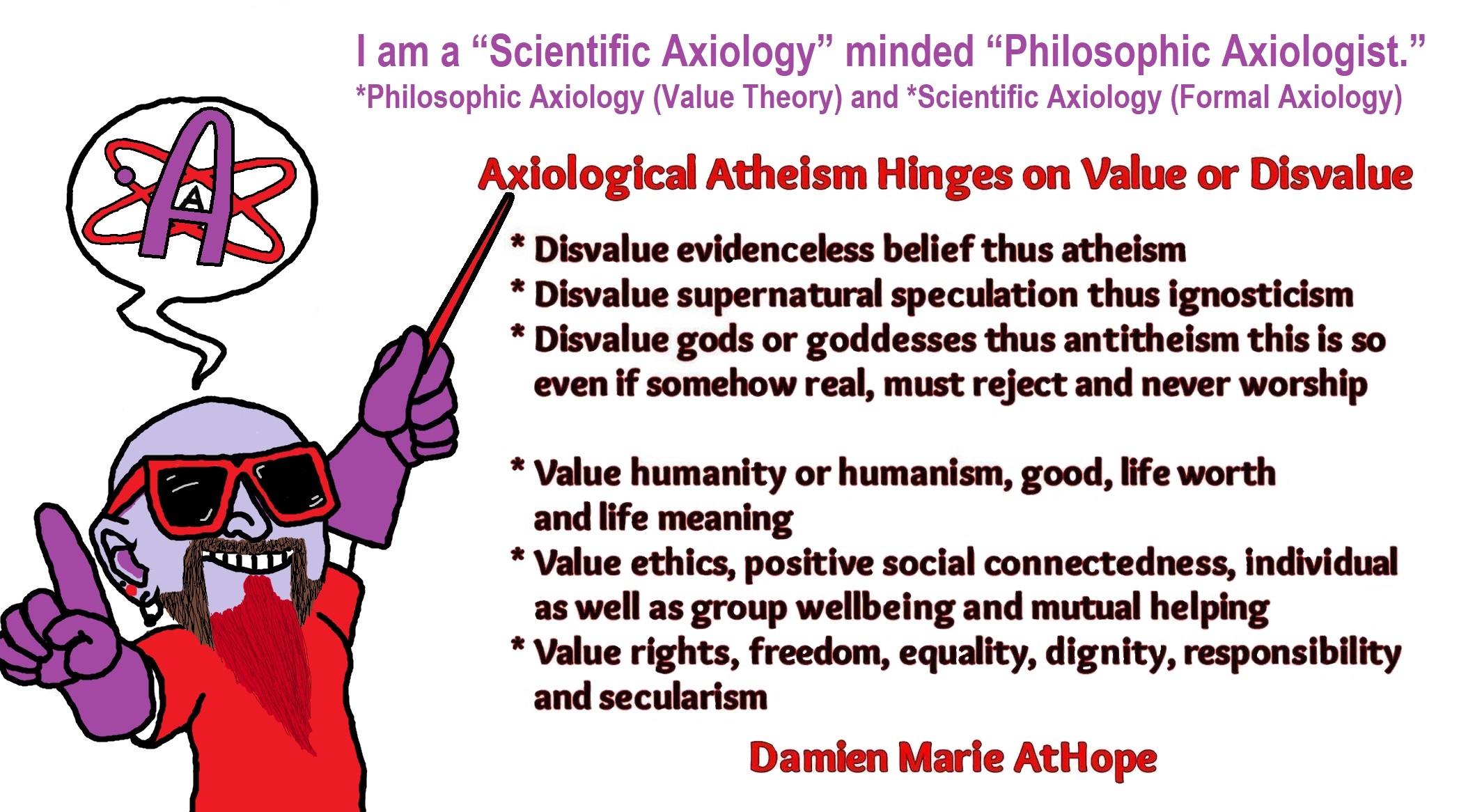
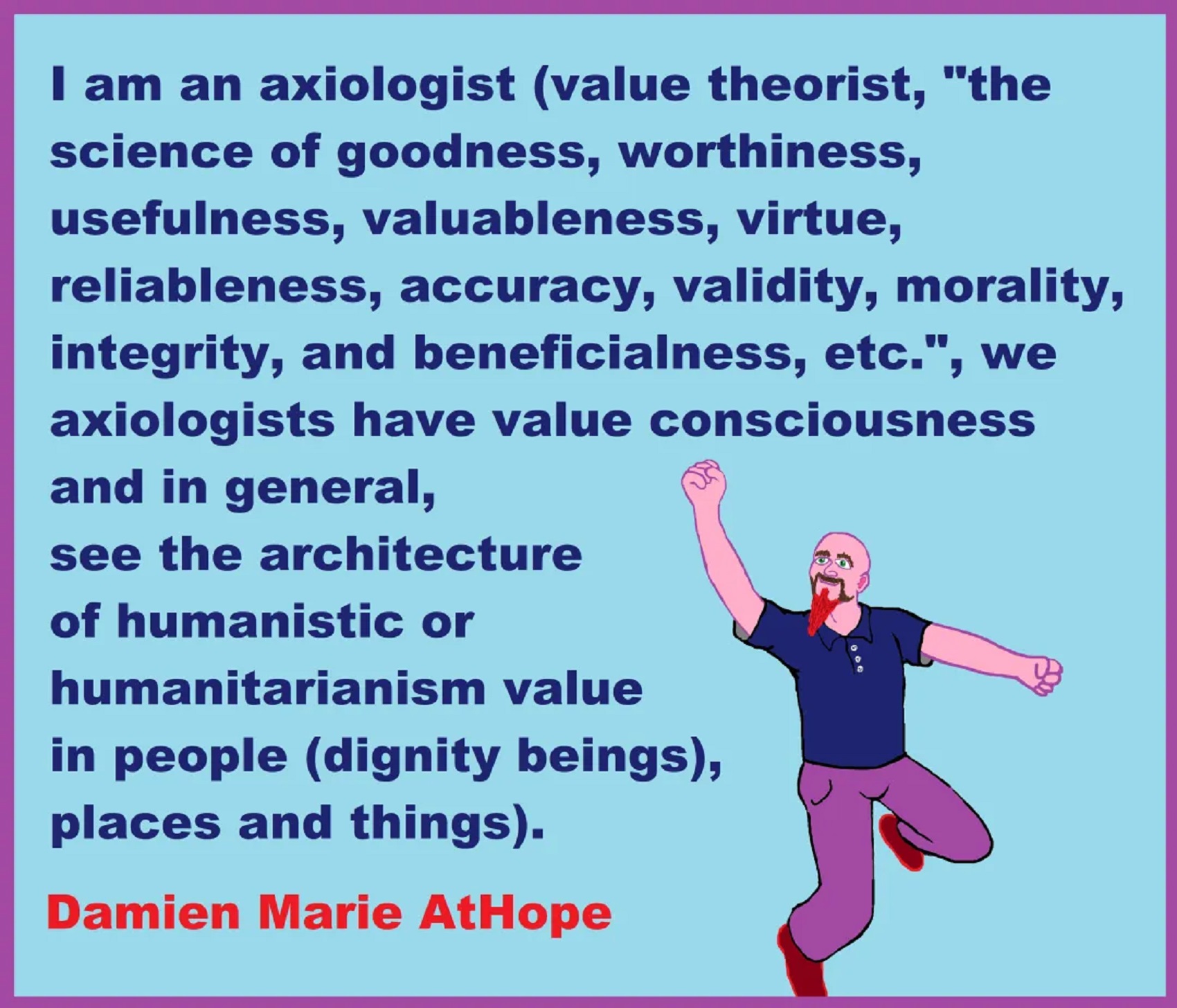
Axiology (value theory) vs. Nihilism (anti/non-value theory)
Axiological (good can be known or communicated and things can have objective realism-value or that value has the potential to be objectively assessed)
Nihilism (value is baseless and nothing good can really be known or communicated and things cannot have an objective realism-value or that value does not have a potential to be objectively assessed)
Scientific realism is, at the most general level, the view that the world described by science is the real world, as it is, independent of what we might take it to be. And in metaphysics, realism about a given object is the view that this object exists in reality independently of our conceptual scheme. In philosophical terms, these objects are ontologically independent of someone’s conceptual scheme, perceptions, linguistic practices, beliefs, etc. Realism can be applied to many philosophically interesting objects and phenomena: other minds, the past or the future, universals, mathematical entities (such as natural numbers), moral categories, the physical world, and thought. Realism can also be a view about the nature of reality in general, where it claims that the world exists independent of the mind, as opposed to non-realist views (like some forms of skepticism and solipsism, which deny the existence of a mind-independent world). Philosophers who profess realism often claim that truth consists in a correspondence link between cognitive representations and reality. Realists tend to believe that whatever we believe now is only an approximation of reality but that the accuracy and fullness of understanding can be improved. Moral realism is the position that ethical sentences express propositions that refer to objective features of the world. Plato’s Forms include the Form of the Good, making them, in addition, a theory of ethical realism. Epistemological realism is a philosophical position, a subcategory of objectivism, holding that what you know about an object exists independently of your mind. It opposes epistemological idealism. Epistemological realism is related directly to the correspondence theory of truth, which claims that the world exists independently and innately to our perceptions of it. Our sensory data then reflect or correspond to the innate world. ref, ref
In anti-realism, the truth of a statement rests on its demonstrability through internal logic mechanisms, such as the context principle or intuitionistic logic, in direct opposition to the realist notion that the truth of a statement rests on its correspondence to an external, independent reality. In anti-realism, this external reality is hypothetical and is not assumed. Anti-realism, may apply to a wide range of philosophic topics, from material objects to the theoretical entities of science, mathematical statement, mental states, events and processes, the past and the future. Metaphysical anti-realism maintains a skepticism about the physical world, arguing either: 1) that nothing exists outside the mind, or 2) that we would have no access to a mind-independent reality, even if it exists. The main alternative to metaphysical anti-realism is metaphysical realism. Characterizing Moral Anti-realism, to hold a realist position with respect to X is to hold that X exists in a mind-independent manner (in the relevant sense of “mind-independence”). On this view, moral anti-realism is the denial of the thesis that moral properties—or facts, objects, relations, events, etc. (whatever categories one is willing to countenance)—exist mind-independently. This could involve either (1) the denial that moral properties exist at all, or (2) the acceptance that they do exist but that existence is (in the relevant sense) mind-dependent. Barring various complications to be discussed below, there are broadly two ways of endorsing (1): moral noncognitivism and moral error theory. Proponents of (2) may be variously thought of as moral non-ojectivists, or idealists, or constructivists. Using such labels is not a precise science, nor an uncontroversial matter; here they are employed just to situate ourselves roughly. ref, ref
“The ‘debate’ between realists and their opponents can take a number of forms. The question of the nature and plausibility of realism arises with respect to a large number of subject matters, including ethics, aesthetics, causation, modality, science, mathematics, semantics, and the everyday world of macroscopic material objects and their properties. Although it would be possible to accept (or reject) realism across the board, it is more common for philosophers to be selectively realist or non-realist about various topics: thus it would be perfectly possible to be a realist about the everyday world of macroscopic objects and their properties, but a non-realist about aesthetic and moral value. In addition, it is misleading to think that there is a straightforward and clear-cut choice between being a realist and a non-realist about a particular subject matter. It is rather the case that one can be more-or-less realist about a particular subject matter. Also, there are many different forms that realism and non-realism can take.” ref
Roughly, axiology believes in some amount of objective value and meaning in life, the other nihilism, on the other hand, denies value especially objective value or most meaning in life thus the two are in a sense against each other.
“Value realism, roughly speaking, is the thesis that value claims (such as friendship is good and burning baby’s feet for fun is bad) can be literally true or false; that some such claims are indeed true; that their truth is not simply a matter of any individual’s subjective attitudes or even of the attitudes of some larger collective; and that facts about value enjoy a certain metaphysical independence from other matters of fact. As this first rough characterization might suggest, realism about value is a matter of degree. While the robust value antirealist will reject all four claims, there are a variety of realist positions from weak objective idealist views, to mind‐independent naturalist views, and finally robustly non‐naturalist views of value.” ref
The principle of truth-value links is a concept in metaphysics discussed in debates between philosophical realism and anti-realism. Philosophers who appeal to truth-value links in order to explain how individuals can come to understand parts of the world that are apparently cognitively inaccessible (the past, the feelings of others, etc.) are called truth-value link realists. ref
- Pragmatic theory of truth, Coherence theory of truth, and Correspondence theory of truth
- Hammer of Truth: Investigate (ONTOLOGY), Expose (EPISTEMOLOGY), and Judge (AXIOLOGY)
- Truth Navigation: Techniques for Discussions or Debates
- Truth Navigation and the fallacy of Fideism “faith-ism”
- Hammer of Truth: Yes, you too, have lots of beliefs…
- Truth is a Value (axiological) Judgment.
- Truth Navigation: “Belief-Etiquette”
- Science and the word “TRUTH”
- The Battle of Truth
- Why are lies more appealing than the truth?
- To Find Truth You Must First Look
- “The Hammer of Truth” Process
- I use a kind of Dialectical Rhetoric = truth persuasion (motivational teaching)
- “Hammer of Truth” response to “Do you Believe in god?”
- Real Truth Seekers?
- “The Hammer of Truth” (scientific philosophy: Ontology, Epistemology, & Axiology) in action.
- Error Crushing Force of the Dialectic Questions and the Hammer of Truth
- Grasping the status of truth (ontology of truth): pre-logic, logic, and post-logic?
- Authoritarian Truth Seekers and Anti-Authoritarian Truth Seekers?
- What makes some believed Truth, actually True?
To me, “truth” is a value judgment we place as a label on what we believe is evidence. Thus, we should be compelled to validate the warrant to believe value judgment we label as “truth” is actually supported with valid and reliable reason and evidence.
Axiology, (from Greek axios, “worthy”; logos, “science”), also called Theory of Value, the philosophical study of goodness, or value, in the widest sense of these terms. Its significance lies (1) in the considerable expansion that it has given to the meaning of the term value and (2) in the unification that it has provided for the study of a variety of questions—economic, moral, aesthetic, and even logical.
Nihilism, (Latin root nihil, meaning “nothing,” that which does not exist.) it can be a form of extreme skepticism maintaining that nothing in the world has a real existence, the rejection of all religious and moral principles, often in the belief that life is meaningless. ref
Nihilism is the belief which labels all values as worthless, therefore, nothing can be known or communicated or associates itself with extreme pessimism and a radical skepticism, having no loyalties. The objective of nihilism manifests itself in several perspectives:
- Epistemological nihilism denies the possibility of knowledge and truth, and is linked to extreme skepticism.
- Political nihilism advocates the prior destruction of all existing political, social, and religious orders as a prerequisite for any future improvement.
- Ethical nihilism (moral nihilism) rejects the possibility of absolute moral or ethical values. Good and evil are vague, and related values are simply the result of social and emotional pressures.
- Existential nihilism, the most well-known view, affirms that life has no intrinsic meaning or value. ref
Roughly, nihilism is the belief that all values are baseless and that nothing can be known or communicated. It is often associated with extreme pessimism and a radical skepticism that condemns existence. A true nihilist would believe in nothing, have no loyalties, and no purpose other than, perhaps, an impulse to destroy.
As an axiologist believer, myself I find it hard to follow the nihilistic argument about there being no objective value and then the nihilist believer wishes to use logic as an objective tool in their defense. If one has no objective value as it seems nihilism wishes to project, how is it not then hindered by this same belief, for to me if there can be no objective standard of value there can be no logical arguments possible when nihilism is in play. Furthermore, it would seem without a way to assess and establish an objective value you can’t even prove that what you the nihilistic arguer are arguing about is in any way meaningful.
Objective: Not influenced by personal feelings or opinions in considering and representing facts.
Logic: A particular system or codification of the principles of proof and inference. logic is necessarily true. A priori truths, like math, are objective.
However, some say they are proud to be a nihilist, but I have to wonder does pride have any meaning in a nihilism conception or is it just a valueless colloquialism? Or are you just expressing moral nihilism not universal nihilism?
Universal Nihilism can be thought of as the view that nothing exists. In order to say something can exist, it must be able to be demonstrated to have the ability to exist for a certain amount of time by reason or evidence. In order to say that something cannot exist for no time at all by reason or a demonstration of evidence of absence, to say that it doesn’t exist at all. Square circles exist for no time at all from logical reasoning. Evidence of absence is evidence of any kind that suggests something is missing or that it does not exist. Not to be confused with Absence of evidence. In this regard, Irving Copi who was a was an American philosopher, logician, and university textbook author writes:
“In some circumstances, it can be safely assumed that if a certain event had occurred, evidence of it could be discovered by qualified investigators. In such circumstances, it is perfectly reasonable to take the absence of proof of its occurrence as positive proof of its non-occurrence.”
Philosopher Steven Hales points out that if one’s standards of certainty leads them to say “there is never ‘proof’ of existence”, then they must also say that “there is never ‘proof’ of non-existence either”.
A negative value judgment (nihilism) is still a kind of value judgment (axiology). Therefore, to me it seems for nihilism try as it may deny value, is actually affirming a belief in an objective negative value, not a neutral or non-value position.
The RULES of logic are objective. So the crux of the problem for many philosophers is only some connection to induction can give them the roots they need to deduce.
Induction, though, is considered unreliable, since it is not “provable.” Therefore, philosophers talk about A Priori Knowledge. The most important piece of a priori knowledge they insist on is the rules of logic. In order for one to use deduction, one must have knowledge of the rules of logic. How does one gain knowledge of it? The answer is through induction. So, they have to come up with methods of pretending that the rules of logic are not dependent on some amount of induction. Which means it is not dependent on perception. Which means it is not dependent on reality.
Induction is the mental process of taking particular facts or instances and generalizing them to form new ideas. It is also called abstraction.
The “soundness” of an abstraction is measured by its adherence to reality. If someone thinks they can “breath underwater” the abstraction does not adhere to reality.
Objective logic:
-If X is true.
-Then, X is true regardless of whether or the observer concludes X is true or X is false. X is true regardless of whether or not the observer has arrived at a conclusion.
That is objective logic. Objective logic is the basis for how knowledge works. 1, 2
Axiological atheism: is a constructive Value centered ethics driven atheism which rejects the existence of gods in favor of a “higher absolute,” such as humanity and society. This form of atheism favors humanity as the absolute source of ethics and values and permits individuals to resolve moral problems without resorting to faith or god myths. Axiological or constructive atheism conveys messages of liberation, full-development, and unfettered happiness. Axiological or constructive atheism life meaning in humanity, ethics, and values surpasses one of the most common criticisms of atheism that denying the existence of a god leads to moral relativism, leaving one with no moral or ethical foundation or renders life meaningless and miserable. Axiological Atheism can be thought to involve ethical/value theory reasoned and moral argument driven atheism, anti-theism, anti-religionism, ignosticism, apatheism, secularism, and humanism. Axiological Atheist can be understood as a value theory or value science Atheist. As such axiological atheism’s ethically reasoning is constructive and pro-humanity. We who believe we are thinking rational, leading to opposition or hate of religion may that be limited to the nonfactual or oppressive ideology and not the people. Beyond just not being something lets be something, rational thinking should challenge myths but also prove our love for humanity and care for all living beings. In most cases, Axiological atheism would assert the traditional concept of “Atheism” answers only a single question: Is there a creator god or not? That is an important question, but if your answer is “no”, it is only a starting point and not a way of life. You may have reached that viewpoint based on your respect for logic, evidence, science, and personal experience which to are vital values. Yet, after you have reached that initial “no god” answer, all the other important questions in life, all the options for mental and emotional wholeness and social and environmental harmony, ethics and morality, personal fulfillment, social values, philosophy, and psychology remain open. That is where “Axiological Atheism” holds a connection to both further challenging the god concept and devaluing religion and adding a value meaning and ethical axiological ideology to guide universally desirable secular ethical way of being or a value driven life lived in this reality. What is Axiology, Formal Axiology & Axiological Profiling? Axiology is the name for “value theory.” It is derived from the Greek word “axios” meaning “worth.” Formal axiology is the logic-based science of value anchored in a “hierarchy of meaning” from the most meaningful or richest value to the most destructive or greatest value loss. The logic specifies 18 different levels of richness. Hartman’s “hierarchy of value” is the mathematical measuring standard for human evaluative judgment and decision-making in life and in all social sectors of life in our culture. When people make value judgments, they use both their mental and emotional capacities to arrive at their decision. Some people have very solid and reliable decision-making abilities – while others routinely make wrong or inaccurate choices. Axiological profiles measure the quality of the respondent’s judgment and decision-making by gauging both their mental clarity and their emotional orientation & conditioning. Dr. Leon Pomeroy in his book, The New Science of Axiological Psychology (Pomeroy, 2005), has shown that formal axiology is also empirically valid. Thus, in our axiological assessment profiles, we have the solid support of both scientific methods: the deductive logic-based axiomatic method and the inductive, empirical method. Dr. Pomeroy spent over 20 years collecting statistical data for his book cross-nationally, from numerous and diverse eastern and western countries and cultures, and proving that cultures all over the world make value judgments in the same way. Neuro‐Axiology: merges Neuroscience understanding how the brain works with Axiology’s formal science that makes possible the objective measurement of value how humans make value judgments. (You will ALWAYS choose what you think adds the MOST value to your life.) Accepting the standard of neuroscientific model of consciousness means that everything we think, feel, remember, and do is a function of the brain. This includes the emotion of empathy. We are not empathic because it makes sense to be empathic – meaning that most humans don’t simply reason their way to empathy. Nor do we simply learn empathy (although brain development is an interactive process with the environment, so we can’t rule out environmental influences). For the most part, we have empathy because our brains are wired with empathy as a specific function. Like every function of the body you can think of, if it is not essential for survival than some subset of the human population likely has a disorder or even absence of this function. We recognize the biological limits of empathy or absence of empathy as the disorder, psychopathy. It is estimated that about 1% of the general population are psychopaths, while about 20-30% of the US prison population. Dr. Robert S. Hartman discovered that people hold back a 40% latent reserve of cooperation and productivity until they have been valued as human beings. Axiology is the science of how humans value and make value judgments as well as how they relate to ethics (not moral values often religious or culture relative). The basics of Axiology are in its 3 Classes of Value and 6 “Advisors”. The following are the Classes of Value: 1. Systemic: plans, rules, best practices, procedures; ideas or expectations 2. Extrinsic: practical or situational; measurable, tracked; tasks (tangible) 3. Intrinsic: personal or transcendent; infinitely valuable; irreplaceable; human beings (intangibles). The following are the 6 Advisors which consist of 2 views of one inward and one outward and one must remember people are neither their thoughts nor their advisors. 1. World View: Empathy-Intuition “people”, Practical Judgment “tasks, & Systems Thinking “plans & ideas” 2. Self View: Self-Esteem “who you are”, Role Awareness “what you do,” & Self Direction “where you go”. The word “Axiological” (to the term “Axiological atheism” is meant to denote an atheistic “Value” rejection of the existence of gods or supreme beings and in favor of a “higher absolute” such as humanity or universal ethical principles. The perception of moral obligation removed from ethical sensitivity to universal justice [is] thus unintelligible as “higher absolute”. As a form of atheism, Axiological favors humanity as the absolute source of holistic ethics and care values which permits individuals to resolve moral problems without resorting to a god’s moral obligation which is anti-humanity and not needing to connect to equal justice. Axiological Atheism can be seen as ethically reasoned antitheism and antireligionism where it is all about axiology values that underlie the universal truths. A few examples of universal truths such as there is no such thing as just rape, no honorable thoughtful unwanted torture, and no just humanistic caring abuse of the innocent. You can offer excuses but the true values violations hold true. Axiologists are broadly concerned with all forms of value including aesthetic values, ethical values, and epistemic values. In a narrow sense, axiologists are concerned with what is intrinsically valuable or worthwhile—what is desirable for its own sake. All axiological issues are necessarily connected to ontological and epistemological assumptions. Axiology in Axiological Atheism can be seen as applying science of morality, referring to its ethically naturalistic views basing morality on rational and empirical consideration of the natural world. The idea of a science of morality has been explored by writers like Joseph Daleiden in The Science of Morality: The Individual, Community, and Future Generations or more recently by neuroscientist Sam Harris in the 2010 book The Moral Landscape. Harris’ science of morality suggests that scientists using empirical knowledge, especially neuropsychology and metaphysical naturalism, in combination with axiomatic values as “first principles”, would be able to outline a universal basis for morality. Harris and Daleiden chiefly argue that society should consider normative ethics to be a domain of science whose purpose amounts to the pursuit of flourishing (well-being). “Science” should not be so narrowly defined as to exclude important roles for any academic disciplines which base their conclusions on the weight of empirical evidence. The term “science of morality” is also sometimes used for the description of moral systems in different cultures or species. The axiological movement emerges from the phenomenological method. The axiologists sought to characterize the notion of value in general, of which moral value is only one species. They argue against Kant, that goodness does not exclusively derive from the will, but exists in objective hierarchies. They emphasize the extent to which it is through emotions and feelings that human beings discern values. The notion of right action is understood derivatively in terms of the values which emotions reveal. Evolutionary psychology seems to offer an account of the evolution of our “moral sense” (conscience) that dispenses with any reference to objective values. It’s apparent elimination of objective values on the grounds of their being unneeded in explanation has led the skeptical writings of J.L. Mackie and Michael Ruse. By contrast, Robert Nozick has resisted this interpretation of evolution (1981) arguing that an evolutionary account of the moral sense can no more dispense with values than an evolutionary account of perception can dispense with perceptual objects objectively present in the world. Axiologists in contemporary ethics are Platonists such as Iris Murdoch and Neo-Kantian theorists such as John Rawls and Robert Nozick. Tenets of Secular Ethics involve a width and diversity of their philosophical views, but secular ethicists generally share one or more principles: • Human beings, through their ability to empathize, are capable of determining ethical grounds. • Human beings, through logic and reason, are capable of deriving normative principles of behavior. • Human beings have the moral responsibility to ensure that societies and individuals act based on these ethical principles. • Societies should if at all possible, advance from a less ethical, less empathy, and unjust form to a more ethical, more empathy and just form. 1 2 3
Nihilistic atheism: judges of the world as it is that it ought not to be, and of the world as it ought to be that it does not exist. According to this view, our existence (action, suffering, willing, feeling) has no meaning and “true morality” is unknown, and secular ethics are impossible; therefore, life has no truth, and no action is known to be preferable to any other. Thus it is incompatible with religion or the concept of a god (won’t accept god, or a moral code based on belief in god) is for people to pursue their “will to power”. Nihilistic atheism presented in the form of existential nihilism, which argues that life is without objective meaning, purpose, or intrinsic value. Moral nihilists assert that morality does not inherently exist and that any established moral values are abstractly contrived. Nihilism can also take epistemological or ontological/metaphysical forms, meaning respectively that, in some aspect, knowledge is not possible, or that reality does not actually exist. It is alleged that atheism necessarily leads to nihilism because atheism necessarily results in materialism, scientism, ethical relativism, and a sense of despair that must lead to feelings of suicide, but such claims are often but professed by those holding atheophobia beliefs. All of these tend to be basic characteristics of nihilistic philosophies. most atheists are not really nihilistic. However, atheism has long been closely associated with nihilism, this may be so whether or not particular atheists even deserve such an attached title, and may have been or still be done both for good and for bad reasons, but usually for bad reasons in the writings of critics of both.1 2
A Little on Nihilism
The term nihilism comes from the Latin word ‘nihil’ which literally means “nothing.” Many believe that it was originally coined by Russian novelist Ivan Turgenev in his novel Fathers and Sons (1862) but it probably first appeared several decades earlier. Nevertheless, Turgenev’s use of the word to describe the views he attributed to young intellectual critics of feudal society generally and the Tsarist regime, in particular, gave the word its widespread popularity. The basic principles which underlie nihilism existed long before there was a term that attempted to describe them as a coherent whole. Most of the basic principles can be found in the development of ancient skepticism among the ancient Greeks. Perhaps the original nihilist was Gorgias (483-378 BCE) who is famous for having said: “Nothing exists. If anything did exist it could not be known. If it was known, the knowledge of it would be incommunicable.” Nihilism has been unjustly regarded as a violent and even terroristic philosophy, but it is true that nihilism has been used in support of violence and many early nihilists were violent revolutionaries. Russian Nihilists, for example, rejected that traditional political, ethical, and religious norms had any validity or binding force on them. They were too few in number to pose a threat to the stability of society, but their violence was a threat to the lives of those in power. There is a common misconception that the German philosopher Friedrich Nietzsche was a nihilist. You can find this assertion in both popular and academic literature, yet as widespread as it is, it isn’t an accurate portrayal of his work. Nietzsche wrote a great deal about nihilism, it is true, but that was because he was concerned about the effects of nihilism on society and culture, not because he advocated nihilism. Ref
I am an Axiological Atheist so I am Anti-Nihilist Atheism
Nietzsche characterized nihilism as emptying the world and
especially human existence of meaning, purpose, comprehensible truth, or essential value.
Axiological/axiology (value theory/value science) Atheism?
Philosophic Axiology (value theory) and Scientific Axiology (formal axiology)
Formal Axiology: Another Victim in Religion’s War on Science
*Philosophic Axiology (value theory)
Explaining Axiological theism, Axiological agnosticism, and Axiological atheism
Axiological Dignity Being Theory
Axiological Atheism not Nihilist Atheism
My quick definition of Axiology and Axiological Atheism?
Confusions in Atheism and Humanism
Axiological Atheist “Damien” Live at 25 MeetUps: Atheist Reality TV
Axiological Atheist Interviews
- Some significant questions in axiology include the following:
- Nature of value: is value a fulfillment of desire, a pleasure, a preference, a behavioral disposition, or simply a human interest of some kind?
- Criteria of value: de gustibus non (est) disputandum (i.e., (“there’s no accounting for tastes”) or do objective standards apply?
- Status of value: how are values related to (scientific) facts? What ultimate worth, if any, do human values have?
- Axiology is usually divided into two main parts.
- Ethics: the study of values in human behavior or the study of moral problems: e.g., (1) the rightness and wrongness of actions, (2) the kinds of things which are good or desirable, and (3) whether actions are blameworthy or praiseworthy.
- Consider this example analyzed by J. O. Urmson in his well-known essay, “Saints and Heroes”:”We may imagine a squad of soldiers to be practicing the throwing of live hand grenades; a grenade slips from the hand of one of them and rolls on the ground near the squad; one of them sacrifices his life by throwing himself on the grenade and protecting his comrades with his own body. It is quite unreasonable to suppose that such a man must be impelled by the sort of emotion that he might be impelled by if his best friend were in the squad.”
- Did the soldier who threw himself on the grenade do the right thing? If he did not cover the grenade, several soldiers might be injured or be killed. His action probably saved lives; certainly, an action which saves lives is a morally correct action. One might even be inclined to conclude that saving lives is a duty. But if this were so, wouldn’t each of the soldiers have the moral obligation or duty to save his comrades? Would we thereby expect each of the soldiers to vie for the opportunity to cover the grenade?
- Æsthetics: the study of value in the arts or the inquiry into feelings, judgments, or standards of beauty and related concepts. Philosophy of art is concerned with judgments of sense, taste, and emotion.
- E.g., Is art an intellectual or representational activity? What would the realistic representations in pop art represent? Does art represent sensible objects or ideal objects?
- Is artistic value objective? Is it merely coincidental that many forms in architecture and painting seem to illustrate mathematical principles? Are there standards of taste?
- Is there a clear distinction between art and reality? Ref
- Ethics: the study of values in human behavior or the study of moral problems: e.g., (1) the rightness and wrongness of actions, (2) the kinds of things which are good or desirable, and (3) whether actions are blameworthy or praiseworthy.
What are values?
The question ‘what are values?’ is deceptively simple.
What are ‘values’ compared to concepts like ‘morals’, ‘ethics’, ‘principles’ or ‘beliefs’? These are abstract and philosophical concepts open to much debate. However, there are several generally accepted definitions that have enough precision to provide schools with a common ground for exploring their approaches to values education. Values are the priorities individuals and society attach to certain beliefs, experiences, and objects in deciding how they shall live and what they shall treasure. (Hill, 2004) principles and fundamental convictions which act as general guides to behavior, the standards by which particular actions are judged as good or desirable. (Halstead, Taylor and Taylor, 2000) Types of values Values as ‘principles and fundamental convictions’ are abstractions until they are applied in the contexts of daily life. Values are made real or ‘realised’ when their meaning is expressed through choices made and behaviors acted out. Emeritus Professor Brian Hill suggests that there are a number of values domains that derive from the contexts in which we live our lives and conduct our relationships. Most commonly, talk about values turns out to talk about matters of morality. But the beliefs we live by, and the objects and activities we treasure, involve not only our moral approach to life but other interests and purposes which make for a rounded life, as illustrated in the diagram. For convenience, it is useful to speak of these various aspects as types or domains of value, ie areas of life in which we operate according to certain values that are appropriate to the activity in question. Our values are the selves we are becoming. There are many different ways of cutting the values cake, of course, so there is bound to be overlap in any categorisation. So talk about ‘domains of value’ is a convenience; not a fixed set of exclusive categories. Ref
These values domains are shown in the diagram:
Axiology is the theory of value or worth. It asks the question: what is good and bad? Axiology is made up of two sub-parts: ethics, which is the theory of the goodness or badness of human behavior, and aesthetics, which is the theory of the goodness or badness of visual appearance or audible sound (expressed in terms of beauty or ugliness). Ref
On the Value of Being a Real Person
Naturalistic Axiology?
Naturalistic Ethics: For the Naturalist, the baseline of value is that which is natural – that is, that which is in conformity with nature. One need not look beyond nature (The biopsychosocial model ) to some immaterial ideal for a standard of right and wrong. Rather, goodness will be found by living in harmony with nature. Evil, for the Naturalist, is a departure from this natural norm either in the direction of excess or defect (i.e., having, or doing, too much or too little of something which is naturally good). Naturalistic Aesthetics: In seeking good appearance, or sound, the Naturalist will look to nature as the standard. Thus, for the Naturalist, art should imitate nature. If a Naturalist is painting a portrait of a person who has a facial scar, the Naturalist will paint the scar because reality includes imperfection. Ref
Pragmatic Axiology?
Pragmatic Ethics: Much that was said in the discussion above about pragmatic epistemology could also be said here about pragmatic ethics. The Pragmatist believes that value claims must be tested and proven in practice. In the Pragmatist’s view, things are value-neutral in themselves. There is nothing that is always good, nor is there anything that is always bad. The value of anything is determined solely in terms of its usefulness in achieving some end. In answer to the question, “Is that good?”, a Pragmatist would probably reply, “Good for what?” Thus, the Pragmatist believes that the end justifies the means. That is, if something is useful for achieving some end or goal, then it becomes good. To state this another way, a means gets its positive value from being an efficient route to the achievement of an end. Thus, a means is not valued for its own sake, but only in relation to its usefulness for achieving some end. Results or consequences are the ultimate measure of goodness for a Pragmatist, since the usefulness of a means to an end can only be judged after the fact by its effect on the end. Thus, for the Pragmatist, there can be no assurance that something is good…until it is tried. Even then, it is only held tentatively as good since a thing is good only as long as it continues to work. Evil, for the Pragmatist, is that which is counterproductive. It is (usually) a breaking of civil or criminal law. There can be a dispute about which means are more effective for achieving an end. Indeed, there can be a dispute about which ends should, in fact, be pursued. Thus, the Pragmatist looks for guidance from the group. The reasons for this are metaphysical: reality is experience, but it is the experience of the whole. For the Pragmatist, the whole is greater than the sum of its parts. This means that the whole is more valuable than any of its parts. In the field of value judgments, the group’s wisdom is more highly esteemed than the wisdom of any individual within the group. Pragmatic Aesthetics: In keeping with the Pragmatist value theory, there is no appearance or sound which is, in itself, good or bad. Appearances or sounds take their value from their relationships to group goals. Thus, in the realm of art, values will be determined by the majority view and in relation to the social benefit of the art in question. Ref
Existentialistic Axiology?
Existentialistic Ethics: As with knowledge, the individual must create his/her own value. There is no escape from the necessity of creating values. Just as the world is defined by the choices regarding knowledge that an individual makes, so the individual must express her/his own preferences. In making choices, or defining values, the individual becomes responsible for those choices. The individual cannot deflect praise or blame for those choices onto others. If the choices were freely made, then responsibility for them must be accepted. While heredity, environment, and society might influence what choices an individual makes, there is a zone of freedom within each individual that cannot be conditioned or predetermined. An Existentialist is not necessarily a non-conformist, but if an Existentialist conforms to the values of a group it will be because that person has freely chosen to do so – not because they have been pressured to do so by the group. Evil, for the Existentialist, is being false to self. It is a breaking of one’s personal law. Existentialistic Aesthetics: The question of what is good in appearance or sound will be determined, in Existentialist terms, solely by each individual. Value, like reality and truth, must be created by the person. It is not *found* pre-existing, or determined by group consensus. Thus, how value is portrayed will be a matter of individual preference. What is good art for you may be bad art for me and vice versa? Ref
Axiology “Goodness-for” questions/assertion: Judge assesses and value judges because of qualities in or lacking in the claim.
*Axiology (understanding what is good or valuable as well as what is evil or unvaluable like how the stories about theist theistic gods are often racist, sexist, homophobic, transphobic intersexphobic, xenophobic, etc. Thus, they are directly against humanity and thus are evil and unvaluable. Unvaluable; as in the god concept you have is evil and demonstrably harmful and thus is highly unvaluable to humanity)
-Why are your objects of proposed value subjective psychological states or objective physiological external world states for your claim?
-Why do your purpose descriptive words fit qualities for valuation (such as “powerful”, “knowing”, and “present” in the Omnipotent: all-powerful, Omniscient: all-knowing, and Omnipresent: all-present god assertion) your claim?
-Why is your value-for, worth-for, and/or goodness-for claims different than other similar claims?
“What value do you think what you are saying has and to what level of proof do you feel truth needs as well as how do you ensure Accuracy” (asking to find the truth or as usual expose the lack of a good Axiology)
Let me explain why as an axiological atheist (value theory atheist) even the belief in the concept of god is ethically vile to me. God belief is inherently immoral to me it is the belief that supports an all powerful being who willfully allows suffering, something that no ethical person would tolerate if they had the ability to do otherwise. Moreover, a common attribute of god belief is support of this claimed greater being of high intelligence and self will forcing its will and standards on other beings of high intelligence and self will. This force is unethical and abusive to the rights of humanity. Furthermore, many who subscribe to this force abusive relationship god claim an even more revolting ethical atrocity called hell where eternal horror and suffering is dished out by direct will of the claimed stronger immoral god being against the defenseless undeserving subjugated humanity. Thus, being one, who values rights and ethics, it sickens me to even speak of such willful misconduct of justice. Your god concept is vile… (axiology value judgment). 1, 2
Origin of Logics is Naturalistic Observation
Scientific Values: fallibilism, realism, & rationalism
Some truth is married to untruth, thus it is hidden in lies. But some may think the truth is just to hard to take for some people so they seem to welcome lies, even if its laid before our eyes. It is this truth we fear that often becomes the fear that may motivate us to only wish to take that which requires no change, no need to reason and understand or emotionally adapt. We too often seem to like easy truth or comfortable lies that become like a mental trap. So then, we often end up marrying our desired truth with some untruth to not see that which is real but unpleasant so to us it stays a lie. Become a protector of truths not a supporter of lies.
Rise, my friend, come to the defense of truth. This charge is required of all honest thinkers. I repeat, rise and let your voice be heard, as this not a time of slumber. No, this is a time of fighting for truth and a time where the truth is in much need as we are literally in a post-truth nation. Rise, become a truth-crusader and support truth in a world of lies.
- Axiology vs. Nihilism
- Axiological Atheism Explained
- Explaining Axiological theism, Axiological agnosticism, and Axiological atheism
- I Am a Rationalist and Support Reasonable Skepticism
- Philosophical Skepticism, Solipsism and the Denial of Reality or Certainty
- You can’t change people, by reason and evidence. WRONG, I do it all the time.
- Ontology, Epistemology, & Axiology argument/challenge protocol
A Different Kind of Atheist:
“Axiological, Methodological, Anarchist, Universal Ethicist, Realist, and Rationalist”
Am I alone?
I am an Axiological (value theory) Atheist, thus I feel compelled to try to care for everyone as much as I can because other people matter and my humanity has a high value to me. But I wonder am I alone as I see and hear lots of people who seem not to feel the same. I wish others self-mastery thus do not feel a need to try and change people who may think differently, rather I wish to create a caring space if I can, so they can see things differently if they wish. I care more about human flourishing then just my disbelief, am I alone?
To quickly understand Axiological Atheism,
it is like humanistic anti-theism and anti-religionism with strong secularism.
I am an Out Atheist, Antitheist, and Antireligionist as a Valuized Ethical Duty.
How can we silently watch as yet another generation is indoctrinated with religious faith, fear, and foolishness? Religion and it’s god myths are like a spiritually transmitted disease of the mind. This infection even once cured holds mental disruption which can linger on for a lifetime. What proof is “faith,” of anything religion claims by faith, as many people have different faith even in the same religion? When you start thinking your “out, atheism, antitheism or antireligionism is not vitally needed just remember all the millions of children being indoctrinated and need our help badly. Ones who desperately need our help with the truth. Three things are common in all religions: “pseudo-science,” “pseudo-history,” and “pseudo-morality.” And my biggest thing of all is the widespread forced indoctrination of children, violating their free choice of what to not believe or believe, I hate forced hereditary religion.
Sometimes a heart of kindness is all I have,
my only weapon to fight for the humanity in a world which is seemly intent on harm.
“Damien, how can you be so nice and kind?” – Questioner
My response, It is very hard indeed but it also shows high character and is to me, an act of courage to be kind in an unkind world. But I am not this world, I aspire to much greater higher-heights. I reject this worlds unkindness. I fight for what is true, helpful, good and right. All themes needed for universal betterment and human flourishing. I fight for people not against them. I wish to be a friend to the world, as you can better persuade people with an open hand then angry words. I appeal to their reason as a helpful counselor, mentor, or teacher that would see their possible frustration as a thing in them, not truly a thing meant for me. I know we cannot change things with more of the same. Rather, we must be the hope and changes so profound that t is like we are no longer holding a reality position of the strife before us. This is because we have the skill to aid others, the gift of human kindness as with that we are the most effective. And to me, kindness is invaluable. I just never stop seeing others as equal dignity beings. We rise by helping each other.
“Damien, in My atheist videos, I can’t do the kind thing I watch you do in every video, which is, I never see anger from you. How can you do it?” – Questioner
My Response, I think of my goal which to help others and doing that I can better control my feelings. I do get angry often but I strive to not express that in my behavior. I wish to be a friend to the world. It has been a life’s work, years of counseling and self-improvement. I now see the value of kindness.
I am an Axiological (Theoretical and Normative VALUE Theorist philosopher) Atheist
Axiology and Value Theory?
Message from a fan:
Noradrenaline and our Presumptions of Reality (regulation of the Brain’s ‘Inner World’)?
Axiological “Presumptive-Value”
Your god myth is an Axiological “Presumptive-Value” Failure
I am an Axiological (value theorist) Atheist, and Claims of god are a Presumptive-Value failure. Simply, if you presume a thing is of value that you can’t justify, then you have committed an axiological presumptive value failure.
Axiological “presumptive-value” Success: Sound Thinker: uses disciplined rationality (sound axiological judgment the evaluation of evidence to make a decision) supporting a valid and reliable justification.
Axiological “presumptive-value” Failure: Shallow Thinker: undisciplined, situational, sporadic, or limited thinking (unsound axiological judgment, lacking required evidence to make a “presumptive-value” success decision) lacking the support of a needed valid and reliable justification.
Often I get disheartened to see that so many people can look at the unknown or that which is devoid of any and all understanding and claim to know that this is evidence for some god or another. How can they with all honesty even say that they somehow already know about an established scientific unknown, when all along it is what it ever was, which I will remind you, is currently holding a confirmed status of unknown. Thus, still fully intact as currently unknowable (I.e. you simply cannot justifiability claim that such unknown is god or evidence of god). What really is a god anyway? The term god equals mystery that is used to explain the mysterious leaving us with yet more mystery, thus explains nothing. Claims of god are a Presumptive-Value failure. Simply, if you presume a thing is of value that you can’t justify, then you have committed an axiological presumptive value failure. Axiological “presumptive-value” Success: Sound Thinker: uses disciplined rationality (sound axiological judgment the evaluation of evidence to make a decision) supporting a valid and reliable justification.
“Ok, So basically, the difference between reasoning with evidence and without?” – Questioner
My response, Well with or without valid justification because of evidence. As in you can’t claim to know the value of something you can’t demonstrate as having good qualities to attach the value claim too so if you lack evidence of the thing in question then you can not validate its value. So it’s addressing justificationism (uncountable) Theory of justification, An (philosophy standard) approach that regards the justification of a claim as primary, while the claim itself is secondary; thus, criticism consists of trying to show that a claim cannot be reduced to the authority or criteria that it appeals to. Think of is as a use matrix. If I say this is of great use for that, can you validate its use or value, and can I use this as a valid method to state a valid justification for my claims without evidence to value judge from? No, thus an axiological presumptive-value failure as a valid anything. Theory of justification is a part of epistemology that attempts to understand the justification of propositions and beliefs. Epistemologists are concerned with various epistemic features of belief, which include the ideas of justification, warrant, rationality, and probability. Loosely speaking, justification is the reason that someone (properly) holds a belief. When a claim is in doubt, justification can be used to support the claim and reduce or remove the doubt. Justification can use empiricism (the evidence of the senses), authoritative testimony (the appeal to criteria and authority), or reason. – Wikipedia
“Presumptions are things that are credited as being true until evidence of their falsity is presented. Presumptions have many forms and value (Axiology) is just one. In ethics, value denotes the degree of importance of something or action, with the aim of determining what actions are best to do or what way is best to live (normative ethics), or to describe the significance of different actions. It may be described as treating actions as abstract objects, putting VALUE to them. It deals with right conduct and living a good life, in the sense that a highly, or at least relatively high valuable action may be regarded as ethically “good” (adjective sense), and that an action of low value, or relatively low in value, may be regarded as “bad”. What makes an action valuable may, in turn, depend on the ethic values of the objects it increases, decreases or alters. An object with “ethic value” may be termed an “ethic or philosophic good” (noun sense). Values can be defined as broad preferences concerning appropriate courses of actions or outcomes. As such, values reflect a person’s sense of right and wrong or what “ought” to be. “Equal rights for all”, “Excellence deserves admiration”, and “People should be treated with respect and dignity” are representatives of values. Values tend to influence attitudes and behavior and these types include ethical/moral values, doctrinal/ideological(religious, political) values, social values, and aesthetic values. It is debated whether some values that are not clearly physiologically determined, such as altruism, are intrinsic, and whether some, such as acquisitiveness, should be classified as vices or virtues.” ref, ref
Disproof by logical contradiction
‘A Logical Impossibility’
(especially in reductio ad absurdum arguments)
Axiological atheism can be thought to involve ethical/value theory reasoned and moral argument driven apatheism, ignosticism, atheism, anti-theism, anti-religionism, secularism, and humanism. The valuations move up the latter as the levels of evaluation is made to value judge all the elements to better understand the value or disvalue available to reach the most accurate valuation reasonable with a sound aware value conciseness. Axiological atheism can be thought to involve Ethical Atheism.
1. Apatheism: we are born and by the fact reality is devoid of magic removes theological desires to understand the obvious naturalistic world, until we learn otherwise. (a “presumptive-value” failure, thus no motivation to adequately start the evaluation needed to understand if there is real value for an Axiology assessment to accurately place it in the value hierarchy). = no value
2. Ignosticism: Sees theological arguments and language as equivocation, contradictory, and/or un-cognitively relatable other than emotionalism or the like. I see Ignosticism as using the Theological non-cognitivism arguments of “mind understanding issues” (rationalism challenging) and an evidentialist/verificationist arguments of “lacking evidence issues” (empiricism challenging). As an atheist, I am a person who disbelieves or lacks belief in the existence of god or gods. In my non-belief, I am also ignostic feeling that every theological position assumes too much about the concept of god(s). As an ignostic, I am a person who rational no idea of anything from reality whatever to label as “a concept of god” thus I can say I have no idea of anything that can connect to the term god and no reason to think anyone else can either. (again a “presumptive-value” failure, no good Ontology of the thing for Identifying values that could influence belief but without what is needed to understand if there is real value for an axiology assessment to accurately place it in the value hierarchy). = no value
3. Atheism: How can we not reject the concept of gods, aka: supposed supreme magical beings, when not even some simple magic is supported in reality. So how then is it not even more ridiculous to claim some supreme magic aka: gods which are even further from reality. May I remind you that faith in the acquisition of knowledge is not a valid method worth believing in. Because, what proof is “faith”, of anything religion claims by faith, as many people have different faith even in the same religion? As an atheist, I am a person who disbelieves or lacks belief in the existence of god or gods. In my non-belief, I am also ignostic feeling that every theological position assumes too much about the concept of god(s). As an ignostic, I am a person who rational no idea of anything from reality whatever to label as “a concept of god” thus I can say I have no idea of anything that can connect to the term god and no reason to think anyone else can either. Atheists talk about gods and religions for the same reason doctors talk about cancer, they are looking for a cure or a firefighter talking about fires because they burn people and they care to stop them. We atheists too often feel a need to help the victim’s of mental slavery, held in the bondage that is the false beliefs of gods and the conspiracy theories of reality found in religions. If you think you believe in a god, “what do you mean by god,” saying a name tells me not one thing about the thing I am asking to know “its” beingness / thingness / attributes / qualities. Thus, what is the thing “god” to which you are talking about and I want you to explain its beingness /thingness / attributes/ qualities? Religious/theistic people with supernatural beliefs often seem as though they haven’t thought much about and that is something we can help using ontology questions about the beingness / thingness / attributes/ qualities they are trying to refer too. What do you mean by god, when you use the term god? And, I am not asking you for the name you attach to the thing you label as a god. I don’t need to know what the god you believe is known “by.” I am asking, what is the thing you are naming as a god and what that thing is, its qualities in every detail like all things have if they are real. Are you just making stuff up or guessing/hoping or just promoting unjustified ideas you want to believe, what is a god? As an atheist, I feel more wonder than I did as a theist because I thought, “big deal” to any wonder I experienced, thinking god could do anything. So with such an unrealistic mindset, everything lost its wonder but it’s the opposite as an atheist. As a theist, the world was full of superstitions and supernatural magic possibilities and thus utilized thinking that was not in the real world. As an atheist all I have now is the real world, not that all atheists seem to get this, we all are in a real world devoid of magic anything, therefore, everything adds to my feeling of awe. There should be little debate with atheist acknowledging discernable reality compared to theists with non-reality claims. Yes, I have way more awe and wonder as an atheist than I ever had as a theist because as a theist anything was possible with god. Therefore, as a theist things where not that amazing. However, as an atheist grasping what an absolute accidental or how random things are, with a 95 to 99 % of all life ever existing on this planet went extinct. I am thoroughly amazed we are even here the evolved children of ancient exploded stars, likely born in galaxies born in super-massive black holes, it’s all amazing. There is no evidence for Gods. But is their proposition outside of reason? As always start in reality from the evidence we do know, such as never in the history of scientific research or investigation has any supernatural claims shown to be true. So it is completely outside of possibility and is utterly ridiculous. Therefore, belief should be rejected as there are no warrants at all and it is axiologically unworthy to such a preponderance to demand disbelief. (yet again a “presumptive value” failure, no good Ontology of the thing not the cognitively meaningful claims relatable to reality that must be attached to all magic and gods claims for Identifying values that could influence belief but without what is needed to understand if there is real value for an axiology assessment to accurately place it in the value hierarchy).
4. Antitheism: Anti-theism requires more than either merely disbelieving in gods or even denying the existence of gods. Anti-theism requires a couple of specific and additional beliefs: first, that theism is harmful to the believer, harmful to society, harmful to politics, harmful, to culture, etc.; second, that theism can and should be countered in order to reduce the harm it causes. If a person believes these things, then they will likely be an anti-theist who works against theism by arguing that it be abandoned, promoting alternatives, or perhaps even supporting measures to suppress it. It’s worth noting here that, however, unlikely it may be in practice, it’s possible in theory for a theist to be an anti-theist. This may sound bizarre at first, but remember that some people have argued in favor of promoting false beliefs if they are socially useful. To me, I think many may have a misconception of the term. Atheism and anti-theism so often occur together at the same time and in the same person that it’s understandable if many individuals fail to realize that they aren’t the same. Making a note of the difference is important, however, because not every atheist is anti-theistic and even those who are, aren’t anti-theistic all the time. Atheism is simply the absence of belief in gods; anti-theism is a conscious and deliberate opposition to theism. Many atheists are also anti-theists, but not all and not always. To me as an antitheist, I see the concept of gods antihumanistic and wholly harmful to a free humanity and if the so-called gods somehow do end up being real that I will switch to direct opposition as I would any tyrant oppressing humanity. Antitheism (sometimes anti-theism) is a term used to describe an opposition to theism. The term has had a range of applications and definitions. In secular contexts, it typically refers to direct opposition to the validity of theism, but not necessarily to the existence of a deity. As an anti-theist, I am a person who is active in opposition to theism: both the concepts of god(s) as well as the religions that support them. This is because theistic concepts and theistic religions are harmful and that even if theistic beliefs were true, they would be undesirable. (And, again a “presumptive value” failure, of the other value challenges of the lesser evaluations and value judgments addressed in the apatheism, ignosticism, atheism value judgment conclusion and an Axiological Atheism assessment of the god concept that must be attached to all magic and gods claims Identifying a lack of value and/or disvalue that influence harm to real value in an axiology assessment to accurately place its value violations in the value hierarchy).
5. Antireligionism: Not just Atheist, axiological atheists should be antitheists but this generally will involve anti-religionism. it would generally thus hold anti-religionist thinking. Especially, I am an anti-religionist, not just an atheist, and here is why summed up in three ideas I am against. And, in which these three things are common in all religions: “pseudo-science”, “pseudo-history”, and “pseudo-morality”. And my biggest thing of all is the widespread forced indoctrination of children, violating their free choice of what to not believe or believe, I hate forced hereditary religion. And my biggest thing of all is the widespread forced indoctrination of children, violating their free choice of what to not believe or believe, I hate forced hereditary religion. As well as wish to offer strong critiques regarding the pseudo-meaning of the “three letter noise” people call “G.o.d” (group originated delusion)! As an anti-religionist, I am a person who can look at religion on the whole and see it is detrimental to the progress of humanity thus am in opposition to all and every religion, not even just opposition to organized religion. In case you were wondering, I am anti-pseudoscience, anti-supernatural, and anti-superstition as well. May I not be a silent watcher as millions of children are subjugated almost before their birth let alone when they can understand thought and are forcibly coerced, compelled, constrained, and indoctrinated in the mental pollution that religion can be. My main goal against religion is to fully stop as much as possible forced indoctrination, one could ask but then why do I challenge all adults faith? well, who do you think is doing the lying to children in the first place. End Hereditary religion, if its a belief let them the equal right to choose to believe. “Religion is an Evolved Product” and Yes, Religion is Like Fear Given Wings… (And, one last time a “presumptive value” failure, of the other value challenges of the lesser evaluations and value judgments addressed in the apatheism, ignosticism, atheism value judgment conclusion and an Axiological Atheism assessment of the god concept and anti-theism assessment of the god show not just a lack of value but a possibly or likely harm demonstrating bot just a lack of value but a real disvalue and that includes the religions potentially removing value in an axiology assessment to accurately place it in the value hierarchy).
6. Secularism: is the only honorable way to value the dignity of others. If it was not true that there is a large unequal distribution of religion contributing to violence then there would be equal religion and atheist secularism violence. You do not see atheists bombing agnostics the very idea is laughable however even different branches of the same religion do will and have killed one another. So, violence not who we are it’s something we need to be compelled to do. Therefore, please support secularism. We are all one connected human family, proven by DNA showing we should treat each other as fellow dignity beings, supported equally (no gods and no masters). States may often have powers, but only citizens have the glue of morality we call rights. And, as they say, in my “dream society”, lots of things are free (aka. planting free food everywhere, free to everyone); but I wonder what you mean when people say you can’t just let things be free, I think, yeah, how can I take free stuff from a free earth. If one observes the virtues of (T. R. U. E. “The Rational Universal Ethics” or “The Responsible Universal Ethics”) that connect to all things as that of the connectedness equality like those which mirror the rays of the sun, fall down equally with a blind but fair indifference. (what is being expressed is that this sun shining will not favor one over another, no, the same upon everyone offering its light to all plant, animal, human, women, men, single or married, homosexual, bisexual, heterosexual, nonreligious, religious, people of means and those without, able-bodied and those which special needs, people of color, and those who are not, those with access to resources and those which out, young and elderly, etc.) All who wish to follow T. R. U. E. thus embodying a universalize equalitarian standard of ethics should strive to be like a ray of connected light to the world, shining equally and freedom to all of the world. By such efforts a nonbiased unitive ethical approach is possible, one would have an increase in positive feelings to help others understanding equalitarian connectedness. If you don’t think different you will not behave differently, if you have never lived differently it is hard to see things differently and if you do not strive to understand difference one is thus unknowingly or not bound by limited encapsulation. I am for a Free Secular Society. I am not for oppression or abuse of religious believer and want a free secular society with both freedoms of religion and freedom from religion. Even though I wish the end of faith and believing in myths and superstition, I wish this by means of informing the willing and not force of the unwilling. I will openly challenge and rebuff religious falsehoods and misunderstanding as well as rebuke and ridicule harmful or unethical religious ideology or behavior.
7. Humanism: is the philosophic thinking that humans can solve human problems by human means, without feeling a need to appeal to the likes of holy books, mystical anything, nor the belief in gods or religions. But, instead, aspires to a true belief in humanity, viewing it with a persuasion of equality. This caring realist thinking found in humanism utilizes an unstated assumption or aspiration, to do no harm as much as possible and to do good whenever one can. Moreover, we are all one connected human family, proven by DNA showing we should treat each other as fellow dignity beings, supported equally. And, no one really owns the earth, we may make claims to it even draw lines on maps thinking this makes the fantasy borders, illusion supported by force and the potential for threat. Thus the ethical truth is we need to share the earth as communally as possible. And use the resources as safe and ethically as possible striving towards sharing and caring. (do no Harm and do good = Humanism). My core definition of humanism is that humans can solve human problems by human means. I am not saying other things can’t or shouldn’t be added to it but to me, a definition of humanism must always contain something coherent to such a thinking or not contradict such as I have offered. Thus, why it is appropriate to say “good without god” when one is a humanist.
- My life; the good, the bad, and the ugly on the road to the Mental Freedom of Atheism
- I Believe Archaeology, not Myths & Why Not, as the Religious Myths Already Violate Reason!
- Archaeological, Scientific, & Philosophic evidence shows the god myth is man-made nonsense.
- Truth is a Value (axiological) Judgment.
- Axiological Atheism not Nihilist Atheism
- Interview of Formal Axiological Atheist Dr. William Kelleher
- I am an Axiological Atheist, with a Rationalist Persuasion, who Supports Anarcho-Humanism
- Axiological Atheism is Intellectualism
- “Value Theory/Value Science” atheism: AXIOLOGICAL ATHEISM
- Explaining Axiological theism, Axiological agnosticism, and Axiological atheism
- Axiological Atheism Supports Humanism & Secularism
- Axiological Atheism Morality Critique: of the bible god
- As an Axiological Atheist, I wish for Human Flourishing
- Psychological certainty and Epistemic certainty?
- Losing My Religion and MY Faith Addiction
- Ignostic Atheist: Do you Have a Coherent Definition of god?
- god Claims are a Non-Reality Commodity
- My Blogs on the Evolution of RELIGION
- Explaining My thoughts on the Evolution of Religion
- My Blogs Somewhat Relating to Science
- I am against Hereditary religion?
- Blogs on Gender/Sexism and Religion
- Lovestyle or Lifestyle Options
- My blog on The Way of a Sound Axiological Thinker
- Main Deity or Religious Belief Systems
I am a “Scientific Axiology” minded “Philosophic Axiologist Theorist” and my conclusion is Axiological atheism. I hear some say that atheism is nothing at all just a non-position, well sure until the moment you have to explain your reasoning to justify it.
How many atheists do you know who offer no reason or evidence at all for their atheism? Not one I can think of.
I don’t think I have ever seen a “Non Position Atheist” someone who stays with I don’t believe because I don’t believe and offers nothing else at all ever to back such a thinking up, because sorry once you do offer reason and evidence it is no longer “Non-Position Atheism” it is “Position Atheism” which is something as it should be, stop trying to make it to nothing as if it is is a non-position. If you don’t have a position fine but that is not more reasonable than having them.
To quickly understand Axiological Atheism,
it is like humanistic anti-theism and anti-religionism with strong secularism.
May the actions of my life be written deep with the poetry of my humanity. Some people fight for people and some seem to just like to fight with people. We are our best when we are showing thoughtful regard, not thoughtless indifference. Be Virtuous to the Vulnerable and a Terror to Tyrants. Yes, be an Honorable Human.
True Morality Not the Golden Rule…
Axiology, Morality and the Dignity Being: “Human Entity”
Axiological Ethics not Pseudo Morality
To me, true morality is not starting with an “us” or “me” focused morality, as morality is a social interaction exchange, thus it must be other focused. Some would say what about, “treating others as they should be treated?” To me, I see everyone as owning themselves all equal, in this right as humans. Moreover, to me morality is behavioral and a social property, there is no immoral thing one can do to themselves as one cannot violate themselves or their own consent as they choose their own actions. Thus, to me, all morality is about others and our interactions with them and them with us. So, morality arises in a social context with all things not that all things have the same moral weight. Therefore, moral relationships with life outside humans have a different moral weight or value. I am not worried that you will be offended by the truth, as I am at how your beliefs offend the truth. Facts are facts, so if you have nonfact beliefs fine but don’t feel bad when I question them.
Reason, Morality, and Emotions?
It saddens me when proponents of atheism also seem to be proponents of anti-intellectualism either in rejecting philosophy or science. I am against all pseudoscience, pseudohistory, and pseudo-morality and the harm they can produce. I am a rationalist, as well as an atheist. Therefore, I am happy to correct the errors in thinking many atheists, agnostics, and skeptics may have, mainly because of the overconfidence in skepticism and the lack of a respect for the supremacy reason needed for logic which is needed to standardize validity. Religion should be seen as ancient mythology to be marveled and laughed at, rather than promoted as truth when it is only feeble pseudo-truth.
And why do we so often error it thinking to wish on myths and not believe in scientific proven “godless-reality”, is because We are emotional beings who have a thinking strategy called reason we only sometimes use. Simply, We are not rational beings who have a bonding strategy called emotions we sometimes use. Atheists talk about gods and religions for the same reason doctors talk about cancer, they are looking for a cure or a firefighter talking about fires because they burn people and they care to stop them. We atheists too often feel a need to help the victim’s of mental slavery, held in the bondage that is the false beliefs of gods and the conspiracy theories of reality found in religions.
Science is a multidisciplinary methodological quest for truth.
Why Ought We Care? Because kindness is like chicken soup to the essence of who we are, by validating the safety needs of our dignity. When the valuing of dignity is followed, a deep respect for one’s self and others as dignity-beings has become one’s path. When we can see with the eyes of love and kindness, how well we finally see and understand what a demonstrates of a mature being of dignity when we value the human rights of others, as we now see others in the world as fellow beings of dignity. We need to understand what should be honored in others as fellow dignity-beings and the realization of the value involved in that. As well as strive to understand how an attack to a person’s “human rights” is an attack to the value and worth of a dignity-being.
So, I am sorry, not sorry that there is no such thing in general, as hurting or harming other beings of dignity without psychological destruction to the dignity being in us. This is an understanding that once done hunts and harm of other beings of dignity emotionally/psychologically hurts and harms your life as an acceptance needy dignity being, as we commonly experience moral discuss involuntary as on our deepest level as dignity beings. Disgust is deeply related to our sense of morality.
Bigfoots, Unicorns, and Gods the rational conclusion using axiology
So how do we form rational conclusions? More importantly, how do we differentiate between the levels involved to establish a conclusions rational viability.
It takes axiology or the value judgment the worthiness or lack thereof in relation to the available reason and evidence.
So let’s start with the axiological viability of Bigfoots
There is no available evidence for Bigfoots.
But is their proposition outside of reason?
Always start in reality from the evidence we do know, such as a primate/nonhuman hominid close to that of both humans and other nonhuman primates is not entirely outside all possibility of reason even though lacking all evidence. Therefore, belief is not warranted and the axiological worthiness of possibility is low enough to motivate disbelief.
The axiological viability of Unicorns (ie. a horse with a single horn on its head)
There is no evidence for Unicorns.
But is their proposition outside of reason?
As always start in reality from the evidence we do know, such as by looking at the evolution of the horse not once was there a horn on any of the several stages of animals to the horse we know today. So it is relatively outside of possibility though as it is still only claiming non-fantastic attributes it is only somewhat ridiculous. Therefore, belief is not in any way warranted and the axiological worthiness is so low to highly support disbelief.
Now the axiological validity of Gods
There is no evidence for Gods.
But is their proposition outside of reason?
As always start in reality from the evidence we do know, such as never in the history of scientific research or investigation has any supernatural claims shown to be true. So it is completely outside of possibility and is utterly ridiculous. Therefore, belief should be rejected as there are no warrants at all and it is axiologically unworthy to such a preponderance to demand disbelief.
Honest to Reality?
will never respect religions but I will always strive to respect people. I do not believe in gods or religions but I do believe in people and value a connected humanity. And after you wake up to the delusion of gods and see that religion and its lies must be rejected. But even if this troubles you don’t see it as an end instead see it as a new beginning. And I hope you learn to quickly hope again. All is not lost when you stop believing in make-believe; though there is always some loss in letting go of that which one’s family members or one’s society deeply believes. However, there is such a wonderful amazing world beyond faith, where there is still ways to hope for and believe in things like a supportive humanity and a new secular liberty shared with new atheist friends.
Taking down god assertions in 123
1. What is a goD? (an ontology question)
2. How can one claim to know anything about a god? (an epistemology question)
3. How valid, good or worthy is a claim that one knows anything about a god? (an axiological question)
“The Hammer of Truth: Ontology, Epistemology and Axiology”
Mock Debate court using the “Hammer of Truth”
- Ontology “Reality” questions/assertion: Witness gives evidence about the claim.
- Epistemology “Truth” questions/assertion: Lawyer searches for warrant or justification for the claim.
- Axiology “Goodness-for” questions/assertion: Judge/Jury assesses and value judges because of qualities in or lacking in the claim.
Always try to follow something similar to this attack order:
*Ontology, (understanding the thingness of things; like what is or can be real, like not god)
-What is your claim?
-What aspects must be there for your claim?
-What makes your claim different than other similar claims?
*Epistemology, (understanding what you know or can know; as in you do have anything in this reality to know anything about this term you call god, and no way of knowing if there is anything non-naturalism beyond this universe and no way to state any about it if there were)
-How do know your claim?
-How reliable or valid must aspects be for your claim?
-How does the source of your claim make it different than other similar claims?
*Axiology, (understanding what is good or valuable as well as what is evil or unvaluable like how the stories about theist theistic gods are often racist, sexist, homophobic, transphobic intersexphobic, xenophobic, etc. Thus, they are directly against humanity and thus are evil and unvaluable. Unvaluable; as in the god concept you have is evil and demonstrably harmful and thus is highly unvaluable to humanity)
-Why are your objects of proposed value subjective psychological states or objective physiological external world states for your claim?
-Why do your purposed descriptive words fit qualities for valuation (such as “powerful”, “knowing”, and “present” in the Omnipotent: all-powerful, Omniscient: all-knowing, and Omnipresent: all-present god assertion) your claim?
-Why is your value-for, worth-for, and/or goodness-for claims different than other similar claims?
Take for instance how Religion supporters try the evaluation tactic of saying “there are peaceful Religions.”
I may respond, what do you mean by Religion and what do you mean by painful or good” (asking to find the truth or as usual expose the lack of a good Ontology)
Then, I may respond, “how do you know that what is your sources and how reliable they are” (asking to find the truth or as usual expose the lack of a good Epistemology)
Then, I may respond, “what value do you think what you are saying has and to what level of proof do you feel truth needs as well as how do you ensure Accuracy” (asking to find the truth or as usual expose the lack of a good Axiology)
A General Thinking in all My Epistemology Theorizing is Justificationism
A general thinking in all “My Ontology, Epistemology, and Axiology theorizing” involves some expression of Justificationism. As in, I require a worthy argument, that is justified with a good warrant(s), quality rich with valid and reliable reason and evidence that is connected to the accuracy of the truth claimed.
What makes a belief an epistemically justified belief?
Probability, best explanation, logical consistency, natural consistency, reliability, and the broadest possible view of plausibility, are some of the standards that must be met. ref
A fact is a statement that is consistent with reality or can be proven with evidence. The word “fact” derives from the Latin factum, and was first used in English with the same meaning: a thing done or performed, a meaning now obsolete. The common usage of “something that has really occurred or is the case” dates from the middle of the sixteenth century. Fact is sometimes used synonymously with truth, as distinct from opinions, falsehoods, or matters of taste. ref
My Hammer of Truth (i.e. ontology, epistemology, and axiology; three philosophies that I use methodologically) both builds and destroys: it aids in building accuracy towards truth and destroy bad claims that are untrue. So again to be clear my Hammer of Truth (i.e. ontology, epistemology, and axiology; three philosophies that I use methodologically) style is a hammer of truth that both builds and destroys: it aids in building accuracy towards truth and destroy bad claims that are untrue.
*(Ontology) What are you talking about, please slow down and give me each specific detail individually?
*(Epistemology) How do you know that and why do you think it is justified or warranted?
*(Axiology) What is its value if any and why do you value that or why would anyone?
If you don’t already know, Dialectic is the art of investigating or discussing the truth of opinions.
What I am trying to say in this message of Dialectic Questions in order to find truth by giving people three questions that can be put towards almost anything and it help remove error and thus improved accuracy.
Dialectic or dialectics (Greek: related to dialogue), also known as the dialectical method, is at base a discourse between two or more people holding different points of view about a subject but wishing to establish the truth through reasoned arguments. Dialectic resembles debate, but shorn of subjective elements such as emotional appeal and the modern pejorative sense of rhetoric. It may be contrasted with the didactic method where one side of the conversation teaches the other. Dialectic is alternatively known as minor logic, as opposed to major logic or critique. ref
Belief-Etiquette
I value good Belief-Etiquette: reasoned belief-acquisitions, good belief-maintenance, and honest belief relinquishment. I am first always a rationalist, as reason is my only master. May I always be a truth seeker and not a blind faith believer. Thinking is good and one claiming otherwise is indeed a person erroring in reason. Which may I remind you is terrible since the most Base Presupposition in our understanding of everything begins in reason.
What we generally call “truth” is a “value judgment” of what we believe is the reality of the case. So, a claim of truth then like all claims needs some type supporting justification. The claim of truth’s integrity requires testing of what the theme of the offered truth involves if validly justified it should not be distrusted. However, if the claim of truth’s integrity is not justified then the term “Truth” has not been itself attacked rather it’s the using the word “Truth” that cannot substantiate the term that it should be distrusted because it is seemingly in error or a lie-pseudo truth. Therefore, the user/claimer of the improper use of the word “Truth” but believe in and promote pseudo-truth because it does not have a sound basis in logic or fact demonstrate the validity and reliability of their truth assertion. So, I love truth, its claims of the term “Truth” with no justification that I can’t stand because such claims are pseudo-truth. It’s like how science as a term is quite corrupted by pseudoscience right? Yes and No. Yes, because fake science is believed as real science where the user/claimer of the improper use of the word “Science” believe in and promote pseudo-science but because it does not have a sound basis in logic or fact demonstrate the validity and reliability of their truth assertion. However, we can know science from pseudoscience as the term is given other methodological structure to which to evaluate then prove true science or prove a claim as not science and in fact pseudoscience so to do we sadly have to a methodological structure to prove a claim as not truth and in fact pseudo-truth.
We Love Generalizations (even if we are wrong)
We don’t like slow clear accurate thinking, no, we are biased irrational compulsive disordered hasty generalizations thinking beings. We build our “belief” of the accuracy of our hasty generalizations one assertion at a time. In other words, we add undue increasing assurance because we keep saying it over and over again, not because it’s actually accurate to the facts. We may cherry pick a few facts to support this error in thinking but that is intellectual dishonesty, as if it can be destroyed by the truth it should be.
- Belief-Etiquette (Disciplined-Rationality)
- The Ontology of Humanistic Economics in Society?
- Challenged or Challenging?
- Openness to Critique?
What is a logical fallacy?
A logical fallacy (“List of Fallacies”) is not the same as lying, although it is still an error if you commit one (and dishonest if you know you are committing one). A lie in logic is a premise that one offers while knowing that it is false. In reasoning to argue a claim, a fallacy is reasoning that is evaluated as logically incorrect and that undermines the logical validity of the argument and permits its recognition as unsound. Regardless of their soundness, all registers and manners of speech can demonstrate fallacies. Because of their variety of structure and application, fallacies are challenging to classify so as to satisfy all practitioners. Fallacies can be classified strictly by either their structure or content, such as classifying them as formal fallacies or informal fallacies, respectively. A fallacy is the use of invalid or otherwise faulty reasoning, or “wrong moves” in the construction of an argument. A fallacious argument may be deceptive by appearing to be better than it really is. Some fallacies are committed intentionally to manipulate or persuade by deception, while others are committed unintentionally due to carelessness or ignorance. The soundness of legal arguments depends on the context in which the arguments are made. ref, ref
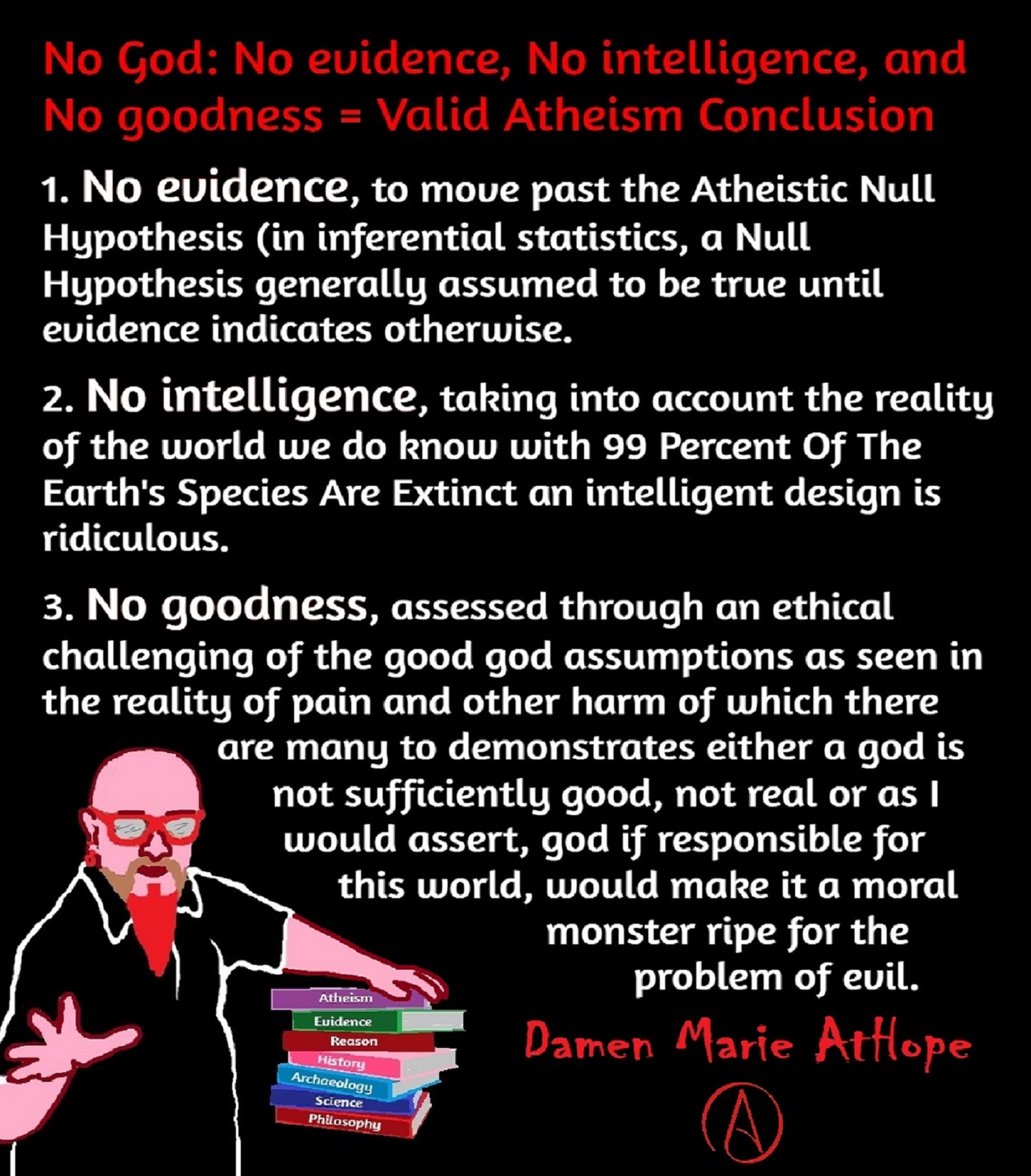
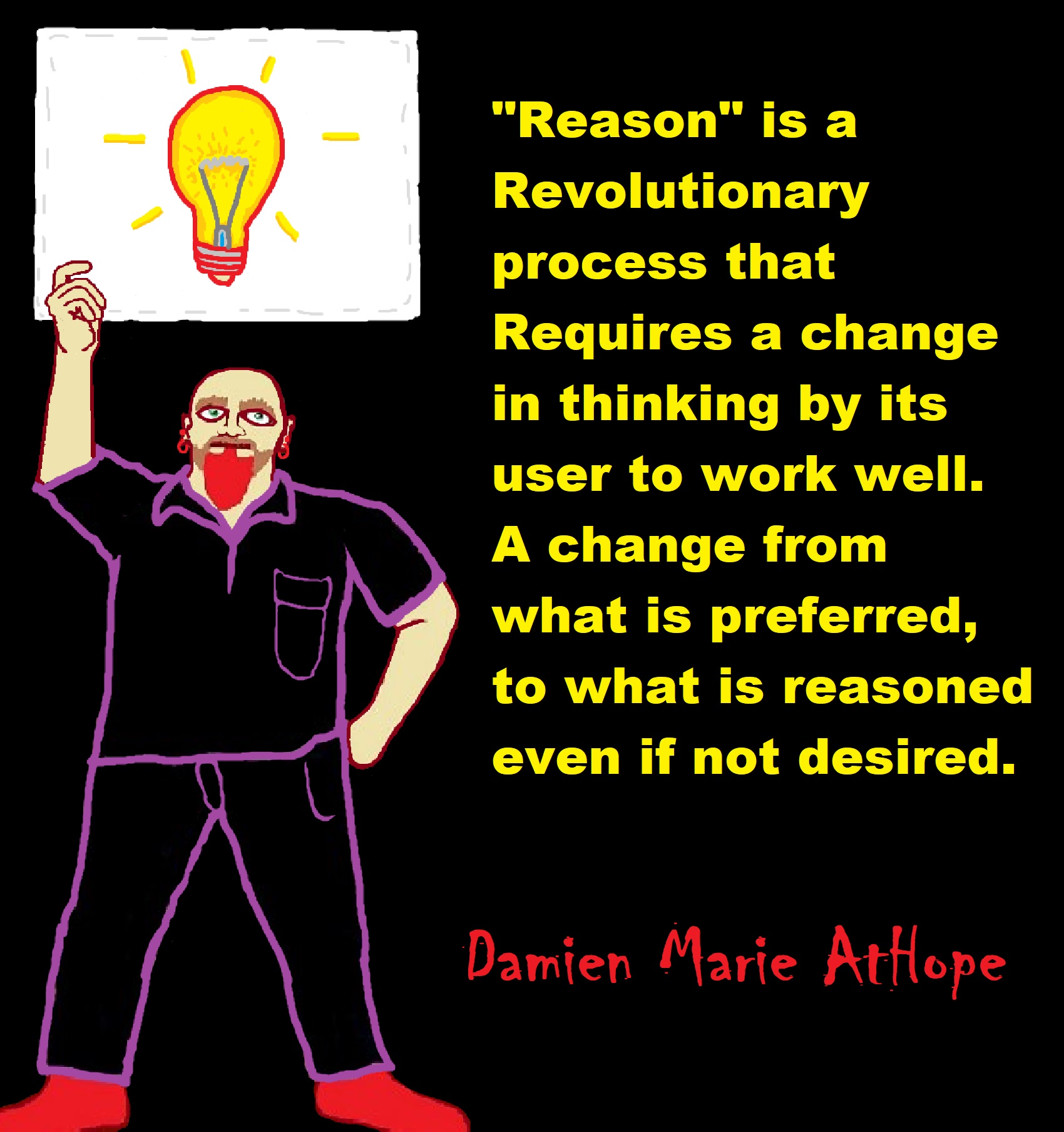
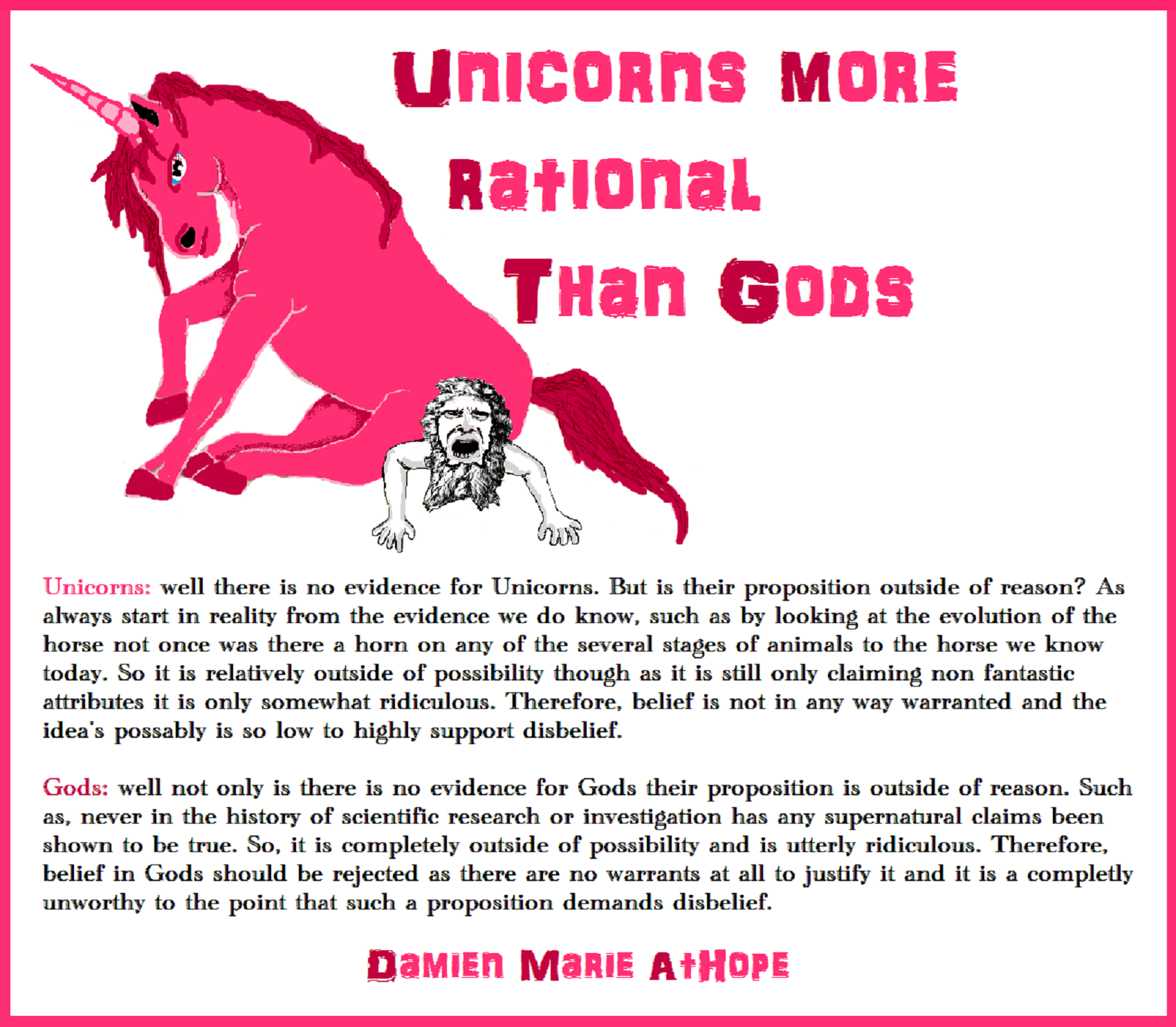
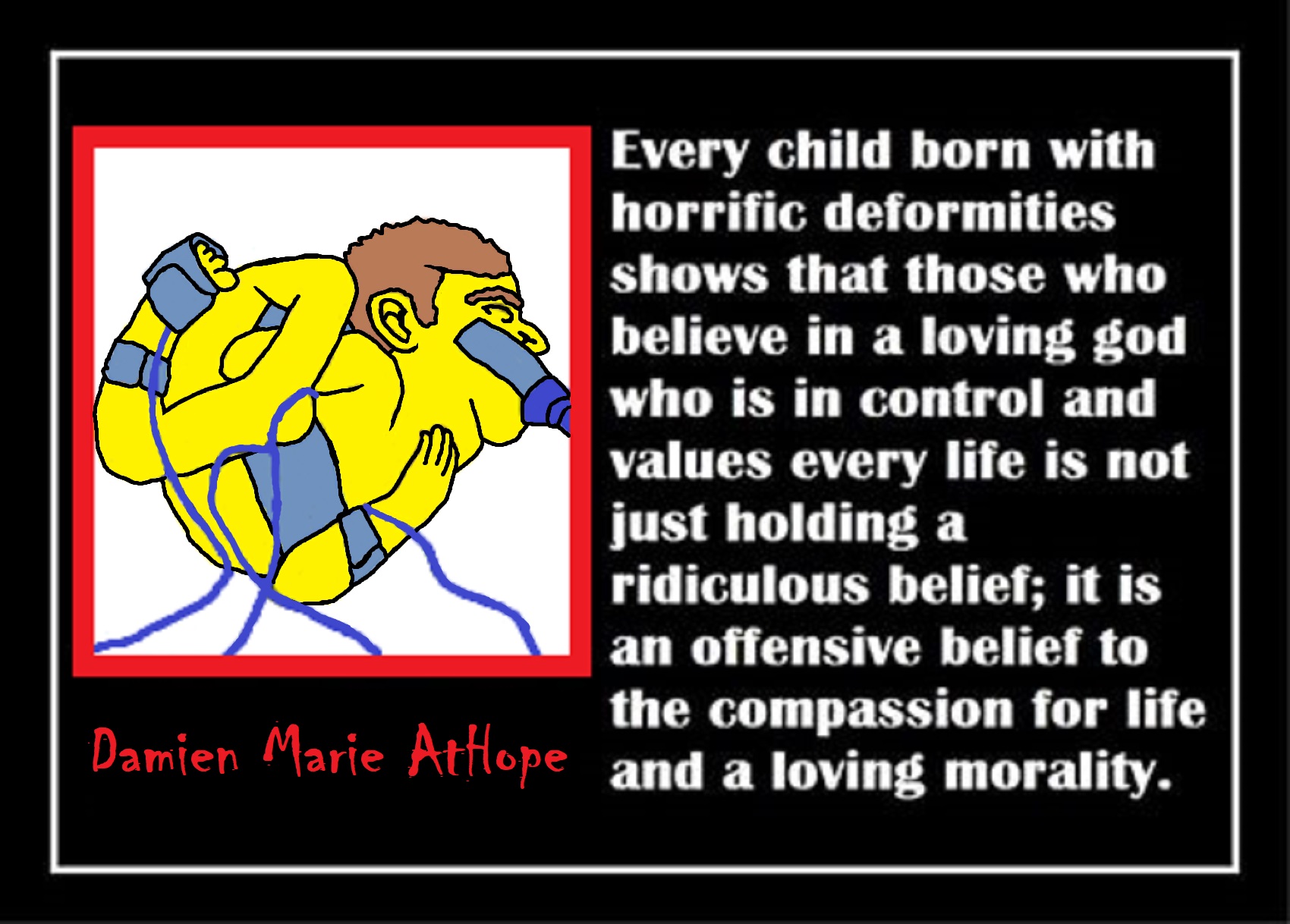
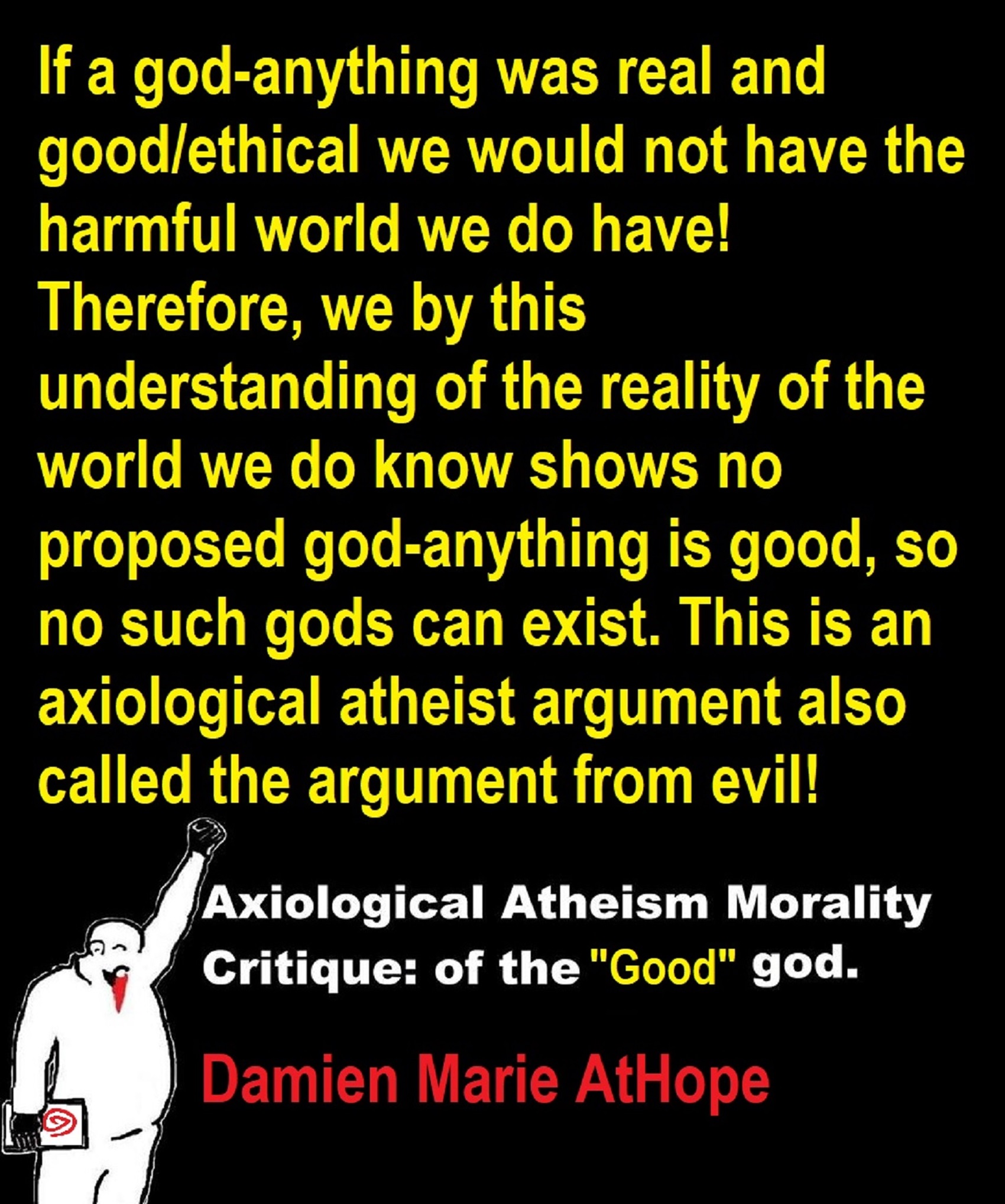
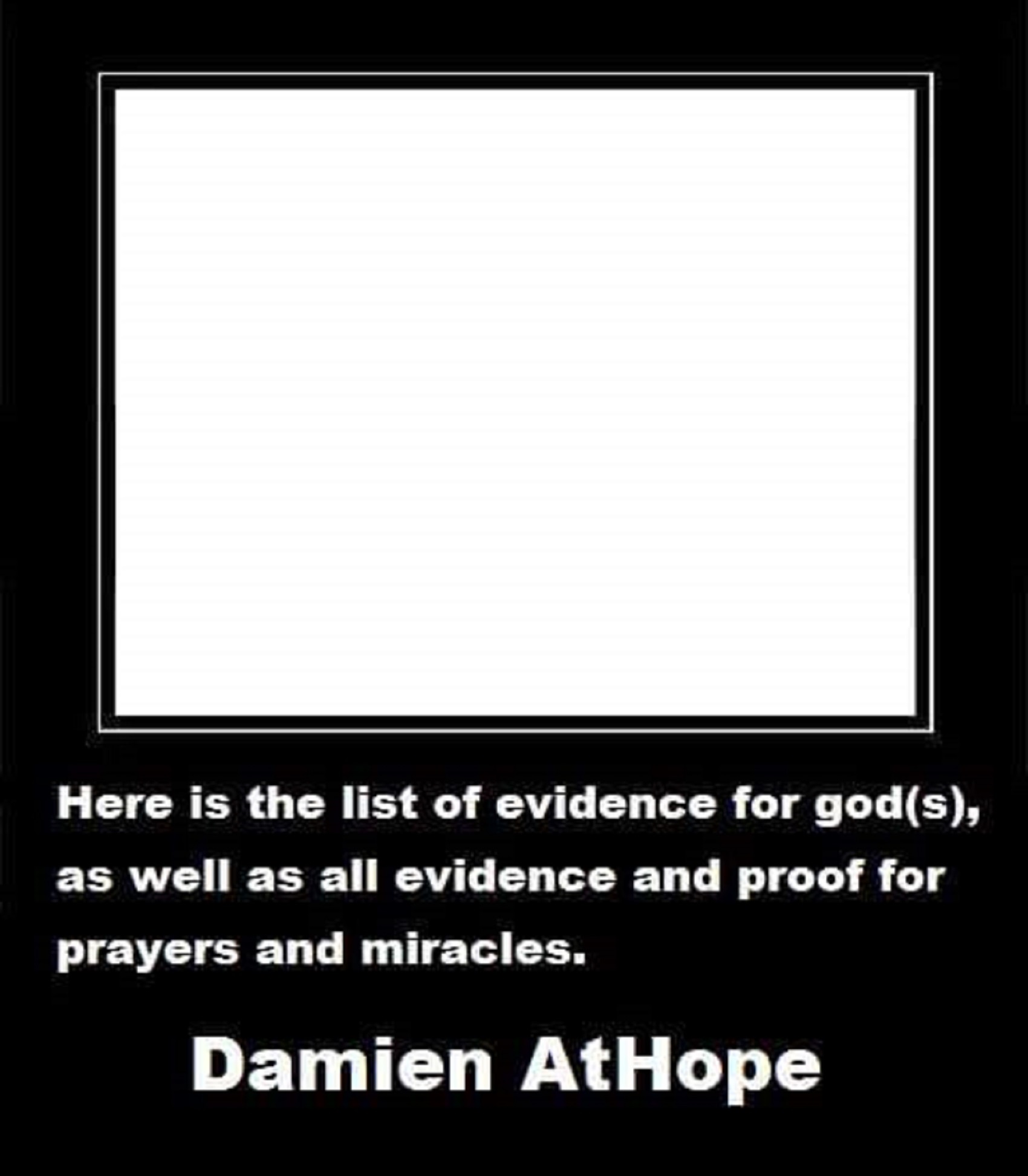
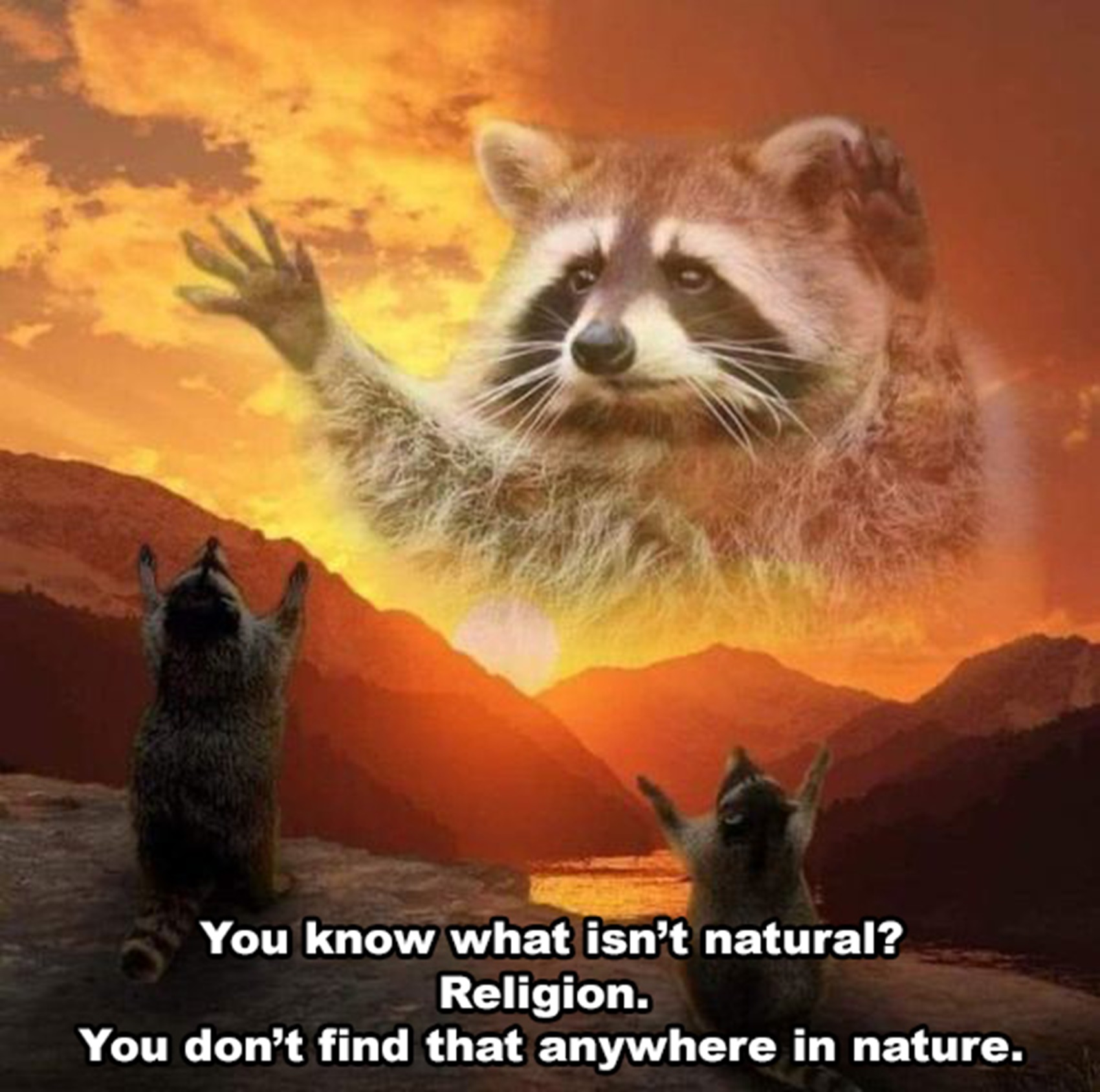
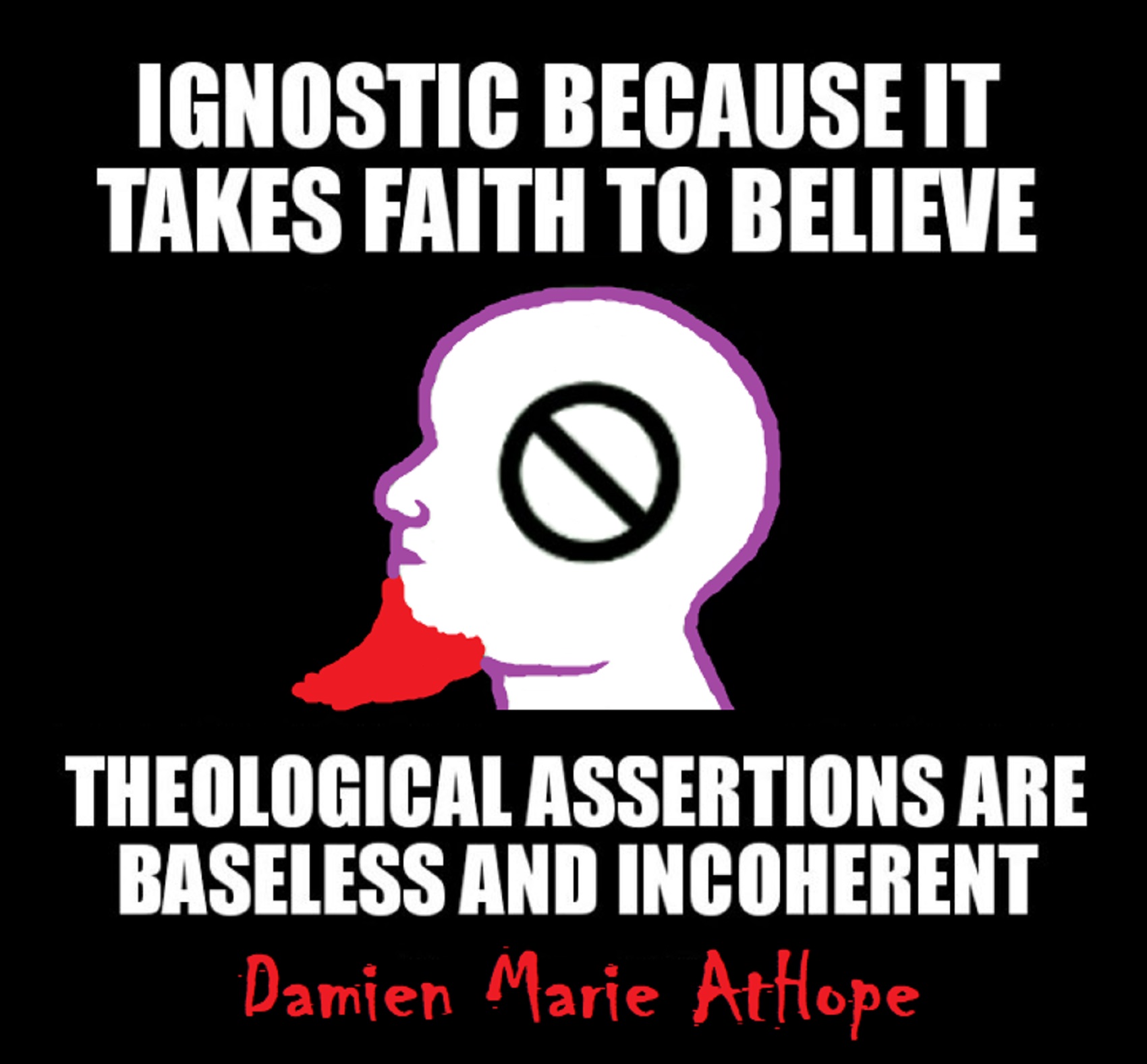
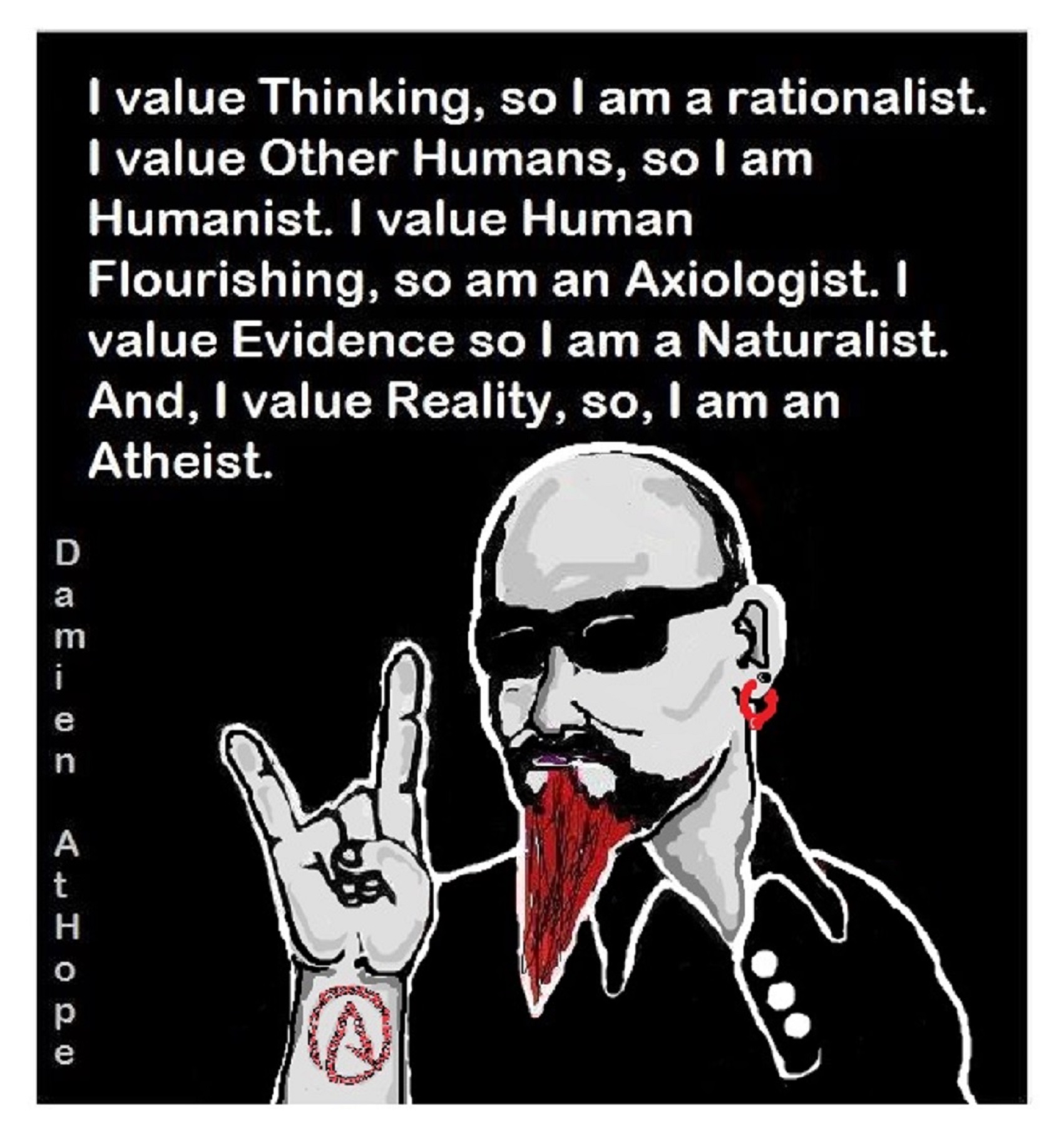

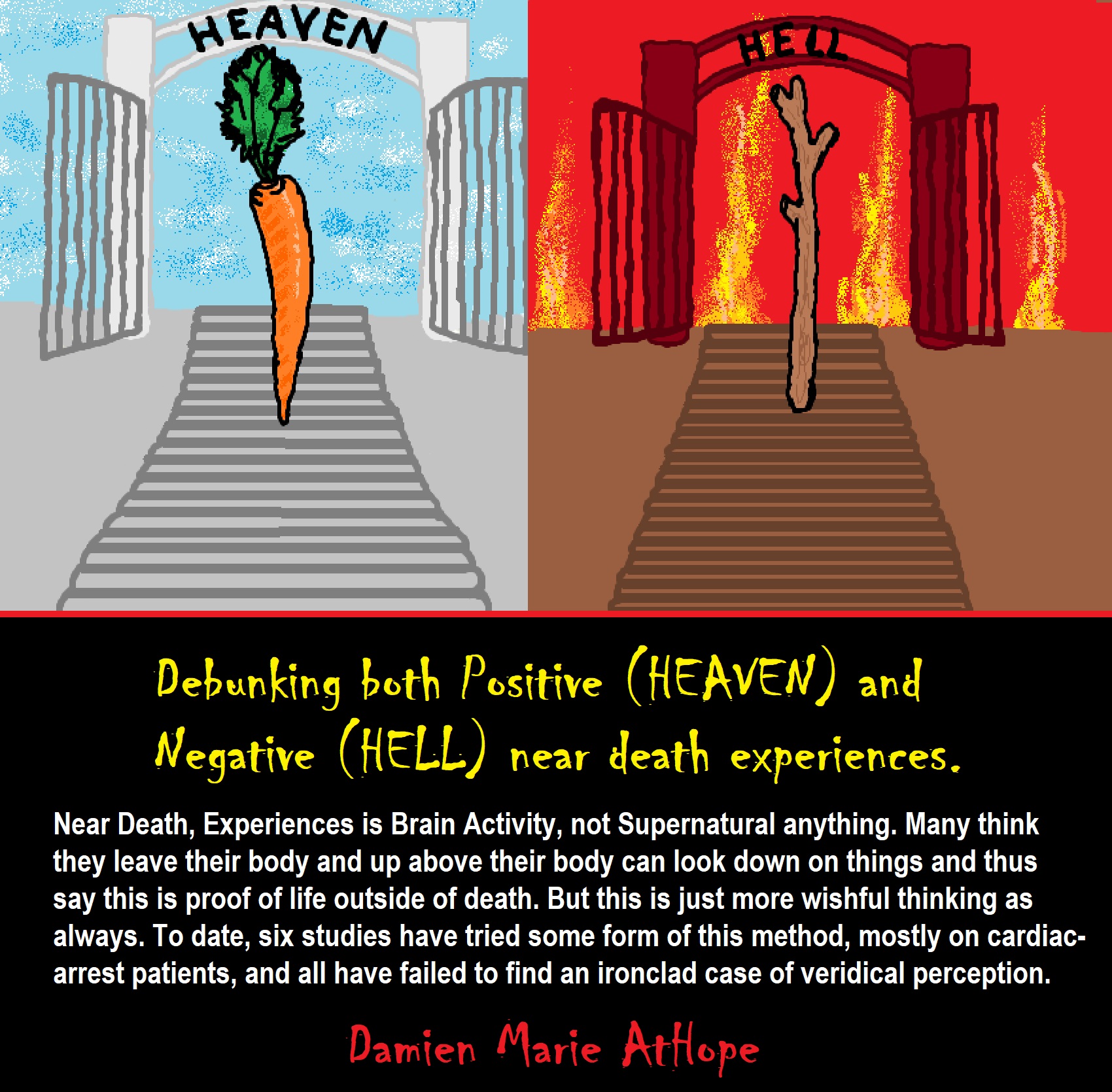
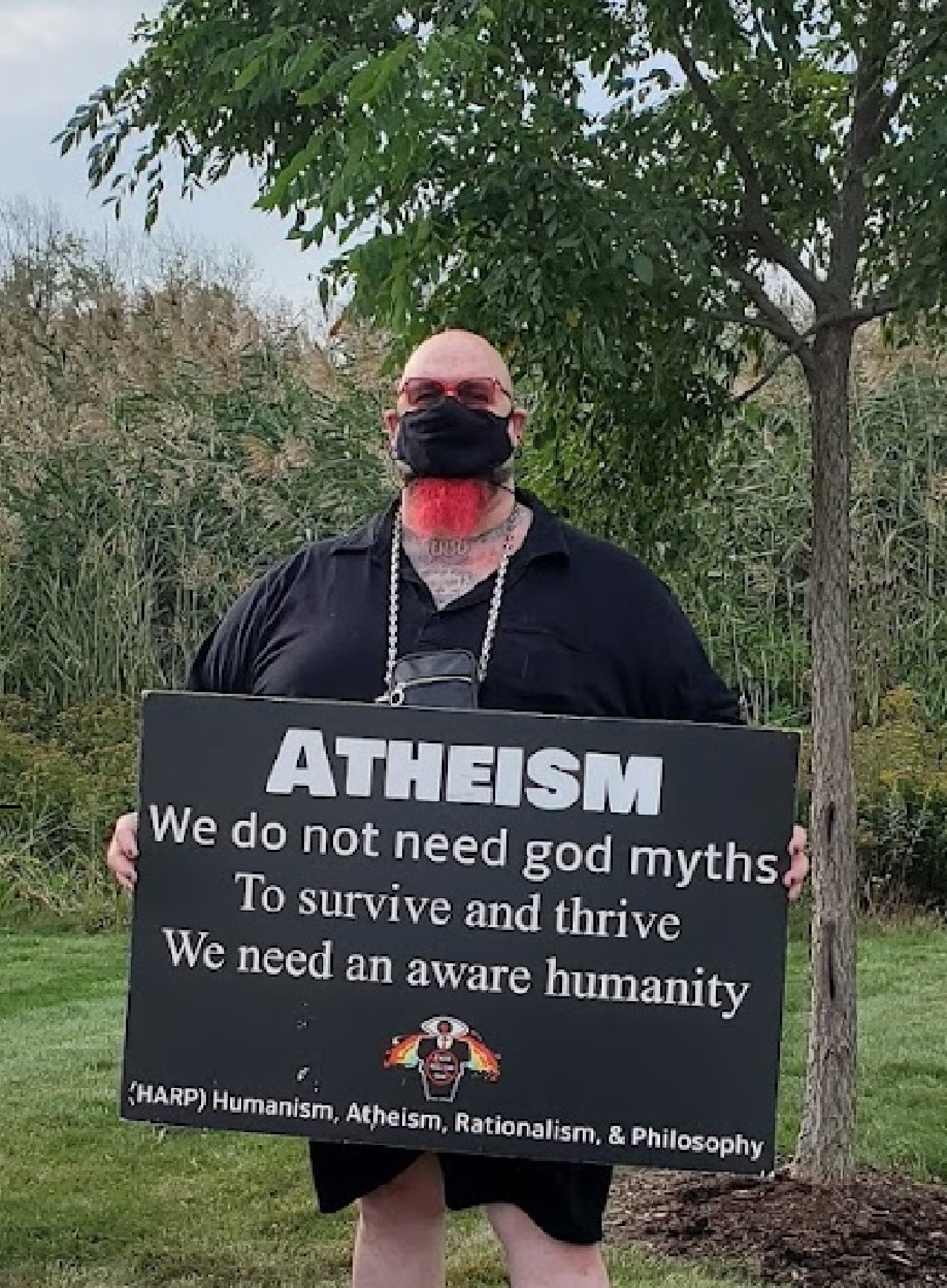


“Theists, there has to be a god, as something can not come from nothing.”
Well, thus something (unknown) happened and then there was something. This does not tell us what the something that may have been involved with something coming from nothing. A supposed first cause, thus something (unknown) happened and then there was something is not an open invitation to claim it as known, neither is it justified to call or label such an unknown as anything, especially an unsubstantiated magical thinking belief born of mythology and religious storytelling.

While hallucinogens are associated with shamanism, it is alcohol that is associated with paganism.
The Atheist-Humanist-Leftist Revolutionaries Shows in the prehistory series:
Show two: Pre-animism 300,000 years old and animism 100,000 years old: related to “Anarchism and Socialism”
Show tree: Totemism 50,000 years old: related to “Anarchism and Socialism”
Show four: Shamanism 30,000 years old: related to “Anarchism and Socialism”
Show five: Paganism 12,000 years old: related to “Anarchism and Socialism”
Show six: Emergence of hierarchy, sexism, slavery, and the new male god dominance: Paganism 7,000-5,000 years old: related to “Anarchism and Socialism” (Capitalism) (World War 0) Elite and their slaves!
Prehistory: related to “Anarchism and Socialism” the division of labor, power, rights, and recourses: VIDEO
Pre-animism 300,000 years old and animism 100,000 years old: related to “Anarchism and Socialism”: VIDEO
Totemism 50,000 years old: related to “Anarchism and Socialism”: VIDEO
Shamanism 30,000 years old: related to “Anarchism and Socialism”: VIDEO
Paganism 12,000 years old: related to “Anarchism and Socialism” (Pre-Capitalism): VIDEO
Paganism 7,000-5,000 years old: related to “Anarchism and Socialism” (Capitalism) (World War 0) Elite and their slaves: VIEDO
Paganism 5,000 years old: progressed organized religion and the state: related to “Anarchism and Socialism” (Kings and the Rise of the State): VIEDO
Paganism 4,000 years old: related to “Anarchism and Socialism” (First Moralistic gods, then the Origin time of Monotheism): VIEDO
I do not hate simply because I challenge and expose myths or lies any more than others being thought of as loving simply because of the protection and hiding from challenge their favored myths or lies.
The truth is best championed in the sunlight of challenge.
An archaeologist once said to me “Damien religion and culture are very different”
My response, So are you saying that was always that way, such as would you say Native Americans’ cultures are separate from their religions? And do you think it always was the way you believe?
I had said that religion was a cultural product. That is still how I see it and there are other archaeologists that think close to me as well. Gods too are the myths of cultures that did not understand science or the world around them, seeing magic/supernatural everywhere.
I personally think there is a goddess and not enough evidence to support a male god at Çatalhöyük but if there was both a male and female god and goddess then I know the kind of gods they were like Proto-Indo-European mythology.
This series idea was addressed in, Anarchist Teaching as Free Public Education or Free Education in the Public: VIDEO
Our 12 video series: Organized Oppression: Mesopotamian State Force and the Politics of power (9,000-4,000 years ago), is adapted from: The Complete and Concise History of the Sumerians and Early Bronze Age Mesopotamia (7000-2000 BC): https://www.youtube.com/watch?v=szFjxmY7jQA by “History with Cy“
Show #1: Mesopotamian State Force and the Politics of Power (Samarra, Halaf, Ubaid)
Show #2: Mesopotamian State Force and the Politics of Power
Show #3: Mesopotamian State Force and the Politics of Power (Uruk and the First Cities)
Show #4: Mesopotamian State Force and the Politics of Power (First Kings)
Show #5: Mesopotamian State Force and the Politics of Power (Early Dynastic Period)
Show #6: Mesopotamian State Force and the Politics of Power
Show #7: Mesopotamian State Force and the Politics of Power (Sargon and Akkadian Rule)
Show #9: Mesopotamian State Force and the Politics of Power (Gudea of Lagash and Utu-hegal)
Show #12: Mesopotamian State Force and the Politics of Power (Aftermath and Legacy of Sumer)

The “Atheist-Humanist-Leftist Revolutionaries”
Cory Johnston ☭ Ⓐ Atheist Leftist @Skepticallefty & I (Damien Marie AtHope) @AthopeMarie (my YouTube & related blog) are working jointly in atheist, antitheist, antireligionist, antifascist, anarchist, socialist, and humanist endeavors in our videos together, generally, every other Saturday.
Why Does Power Bring Responsibility?
Think, how often is it the powerless that start wars, oppress others, or commit genocide? So, I guess the question is to us all, to ask, how can power not carry responsibility in a humanity concept? I know I see the deep ethical responsibility that if there is power their must be a humanistic responsibility of ethical and empathic stewardship of that power. Will I be brave enough to be kind? Will I possess enough courage to be compassionate? Will my valor reach its height of empathy? I as everyone, earns our justified respect by our actions, that are good, ethical, just, protecting, and kind. Do I have enough self-respect to put my love for humanity’s flushing, over being brought down by some of its bad actors? May we all be the ones doing good actions in the world, to help human flourishing.
I create the world I want to live in, striving for flourishing. Which is not a place but a positive potential involvement and promotion; a life of humanist goal precision. To master oneself, also means mastering positive prosocial behaviors needed for human flourishing. I may have lost a god myth as an atheist, but I am happy to tell you, my friend, it is exactly because of that, leaving the mental terrorizer, god belief, that I truly regained my connected ethical as well as kind humanity.
Cory and I will talk about prehistory and theism, addressing the relevance to atheism, anarchism, and socialism.
At the same time as the rise of the male god, 7,000 years ago, there was also the very time there was the rise of violence, war, and clans to kingdoms, then empires, then states. It is all connected back to 7,000 years ago, and it moved across the world.
Cory Johnston: https://damienmarieathope.com/2021/04/cory-johnston-mind-of-a-skeptical-leftist/?v=32aec8db952d
The Mind of a Skeptical Leftist (YouTube)
Cory Johnston: Mind of a Skeptical Leftist @Skepticallefty
The Mind of a Skeptical Leftist By Cory Johnston: “Promoting critical thinking, social justice, and left-wing politics by covering current events and talking to a variety of people. Cory Johnston has been thoughtfully talking to people and attempting to promote critical thinking, social justice, and left-wing politics.” http://anchor.fm/skepticalleft
Cory needs our support. We rise by helping each other.
Cory Johnston ☭ Ⓐ @Skepticallefty Evidence-based atheist leftist (he/him) Producer, host, and co-host of 4 podcasts @skeptarchy @skpoliticspod and @AthopeMarie
Damien Marie AtHope (“At Hope”) Axiological Atheist, Anti-theist, Anti-religionist, Secular Humanist. Rationalist, Writer, Artist, Poet, Philosopher, Advocate, Activist, Psychology, and Armchair Archaeology/Anthropology/Historian.
Damien is interested in: Freedom, Liberty, Justice, Equality, Ethics, Humanism, Science, Atheism, Antiteism, Antireligionism, Ignosticism, Left-Libertarianism, Anarchism, Socialism, Mutualism, Axiology, Metaphysics, LGBTQI, Philosophy, Advocacy, Activism, Mental Health, Psychology, Archaeology, Social Work, Sexual Rights, Marriage Rights, Woman’s Rights, Gender Rights, Child Rights, Secular Rights, Race Equality, Ageism/Disability Equality, Etc. And a far-leftist, “Anarcho-Humanist.”
I am not a good fit in the atheist movement that is mostly pro-capitalist, I am anti-capitalist. Mostly pro-skeptic, I am a rationalist not valuing skepticism. Mostly pro-agnostic, I am anti-agnostic. Mostly limited to anti-Abrahamic religions, I am an anti-religionist.
To me, the “male god” seems to have either emerged or become prominent around 7,000 years ago, whereas the now favored monotheism “male god” is more like 4,000 years ago or so. To me, the “female goddess” seems to have either emerged or become prominent around 11,000-10,000 years ago or so, losing the majority of its once prominence around 2,000 years ago due largely to the now favored monotheism “male god” that grow in prominence after 4,000 years ago or so.
My Thought on the Evolution of Gods?
Animal protector deities from old totems/spirit animal beliefs come first to me, 13,000/12,000 years ago, then women as deities 11,000/10,000 years ago, then male gods around 7,000/8,000 years ago. Moralistic gods around 5,000/4,000 years ago, and monotheistic gods around 4,000/3,000 years ago.
To me, animal gods were likely first related to totemism animals around 13,000 to 12,000 years ago or older. Female as goddesses was next to me, 11,000 to 10,000 years ago or so with the emergence of agriculture. Then male gods come about 8,000 to 7,000 years ago with clan wars. Many monotheism-themed religions started in henotheism, emerging out of polytheism/paganism.

Damien Marie AtHope (Said as “At” “Hope”)/(Autodidact Polymath but not good at math):
Axiological Atheist, Anti-theist, Anti-religionist, Secular Humanist, Rationalist, Writer, Artist, Jeweler, Poet, “autodidact” Philosopher, schooled in Psychology, and “autodidact” Armchair Archaeology/Anthropology/Pre-Historian (Knowledgeable in the range of: 1 million to 5,000/4,000 years ago). I am an anarchist socialist politically. Reasons for or Types of Atheism
My Website, My Blog, & Short-writing or Quotes, My YouTube, Twitter: @AthopeMarie, and My Email: damien.marie.athope@gmail.com

